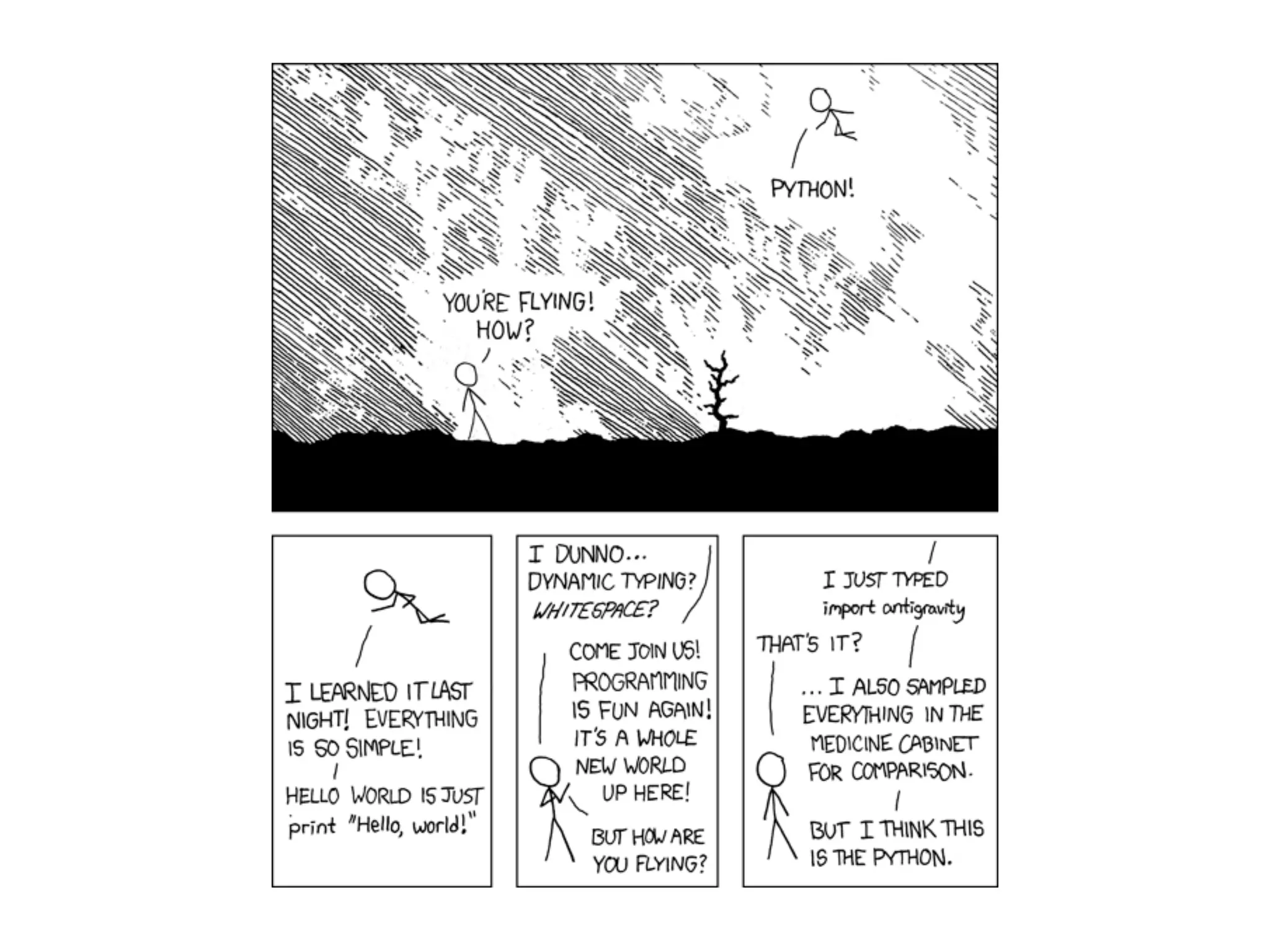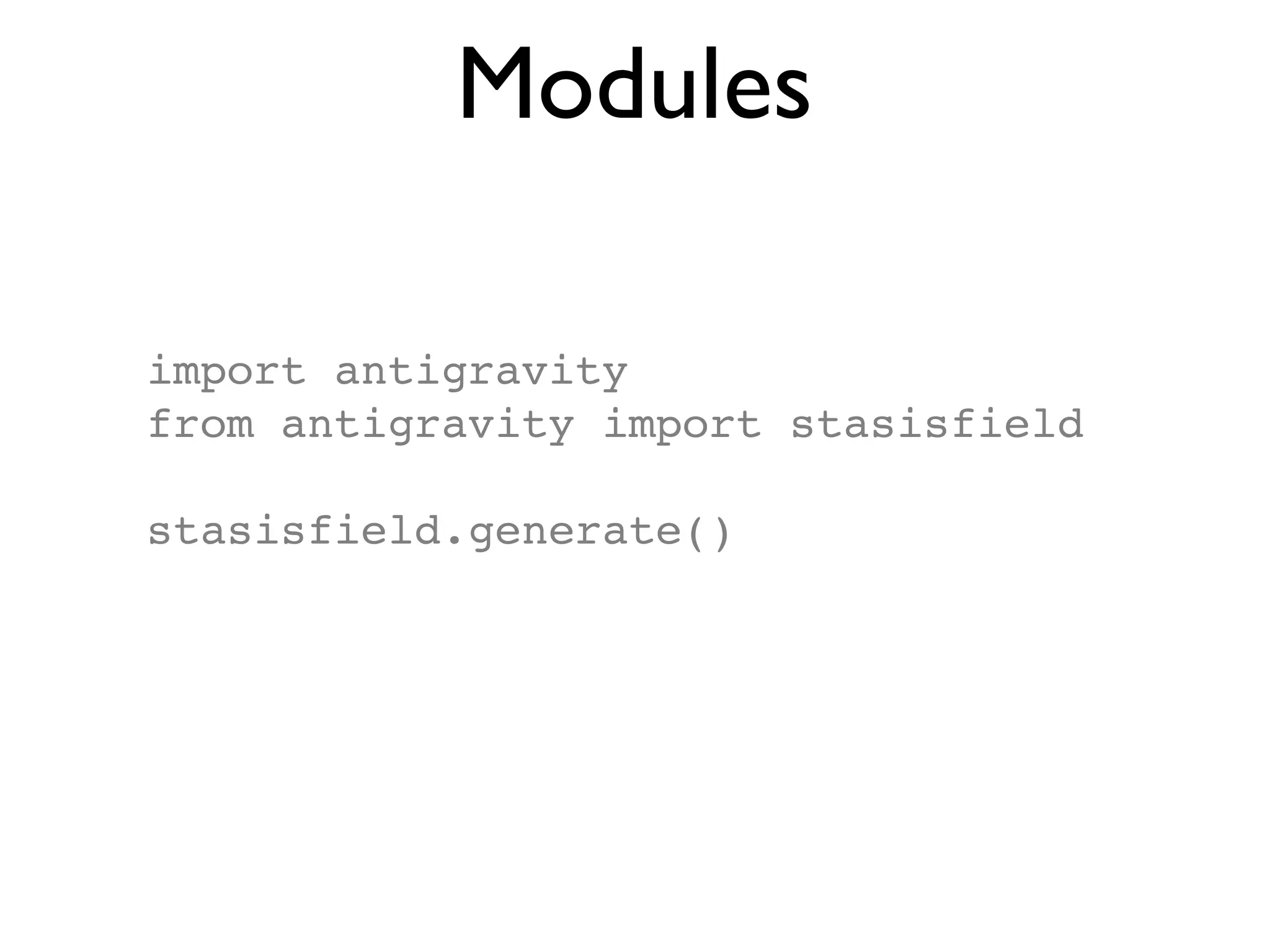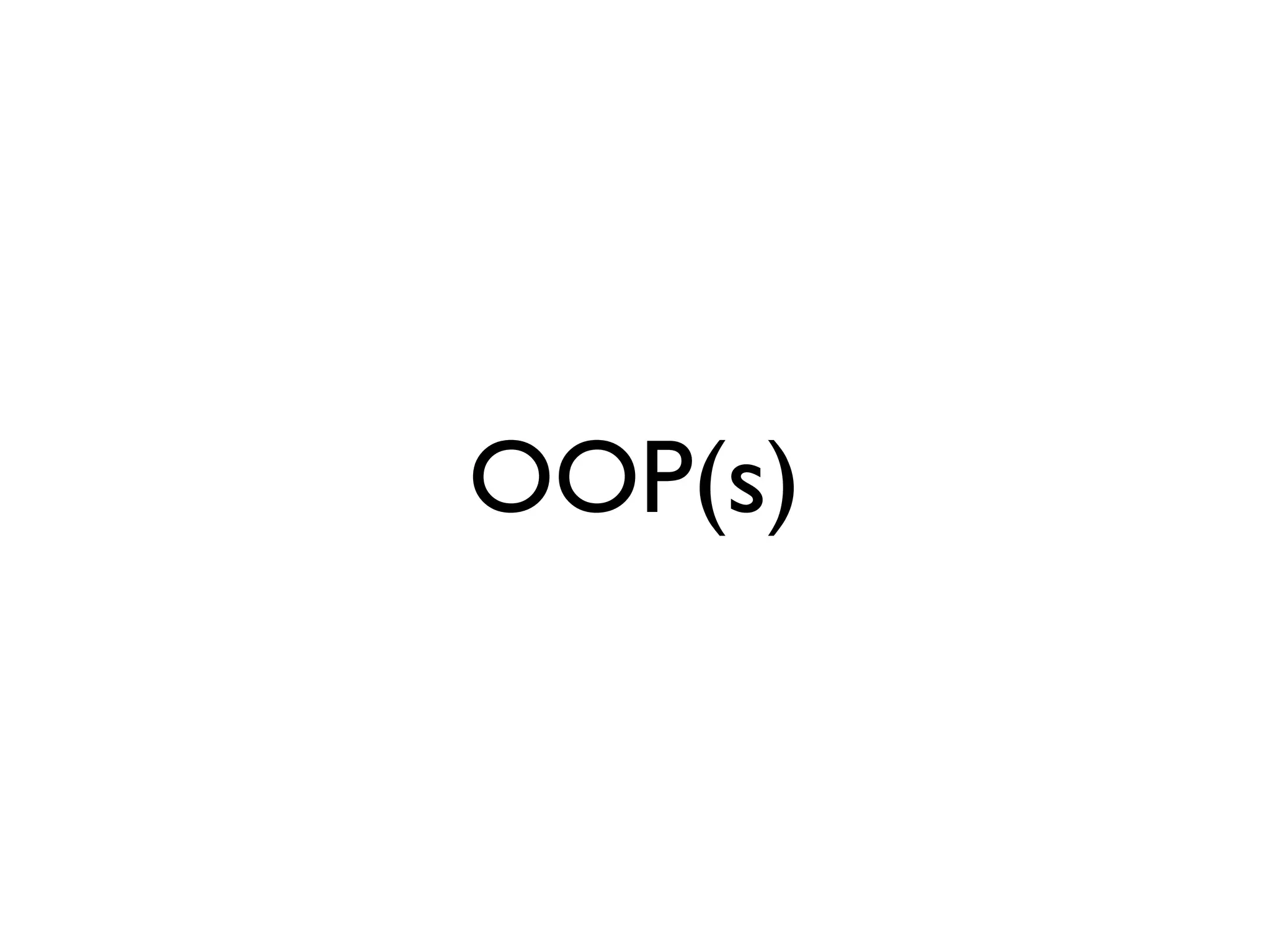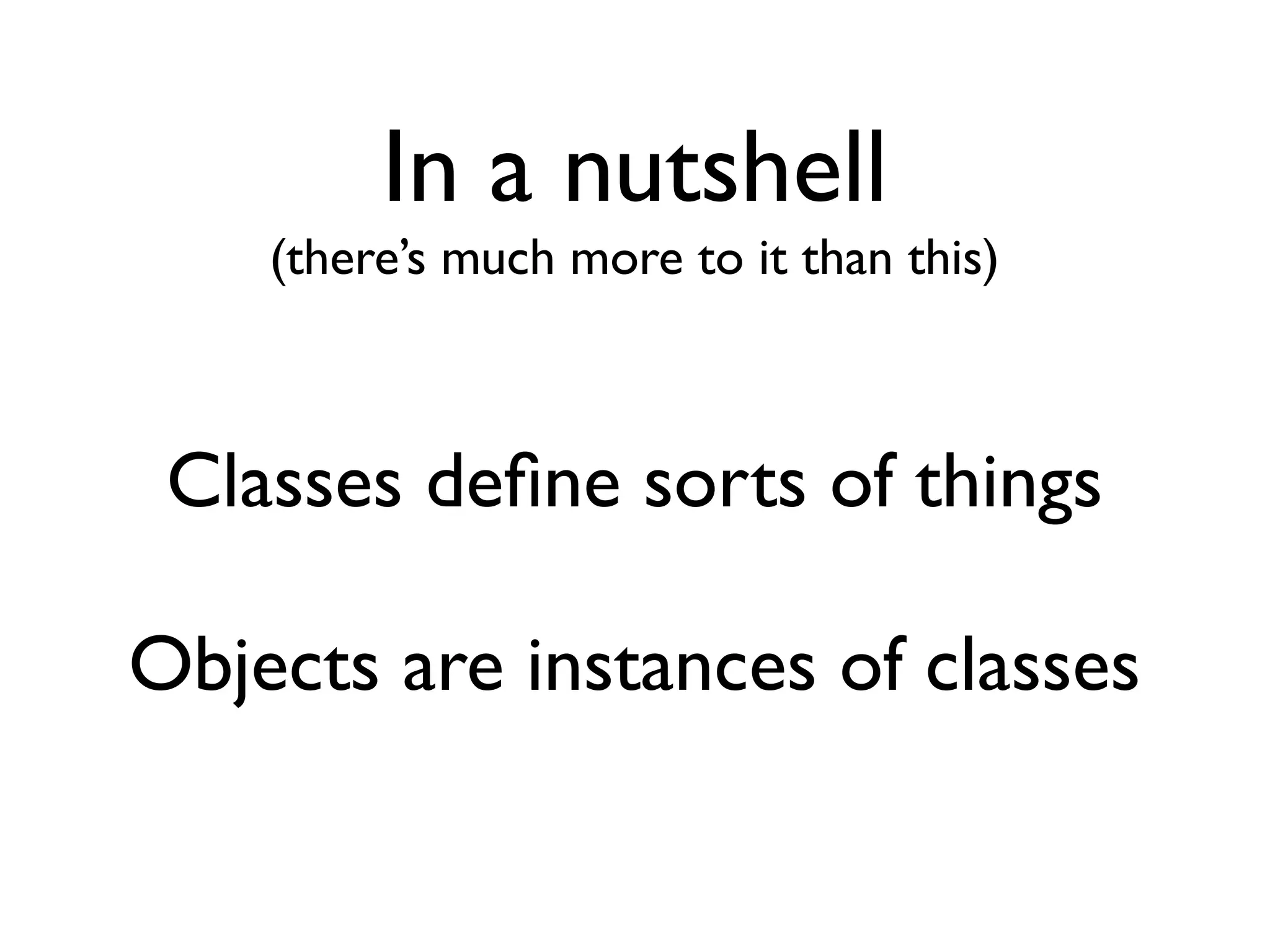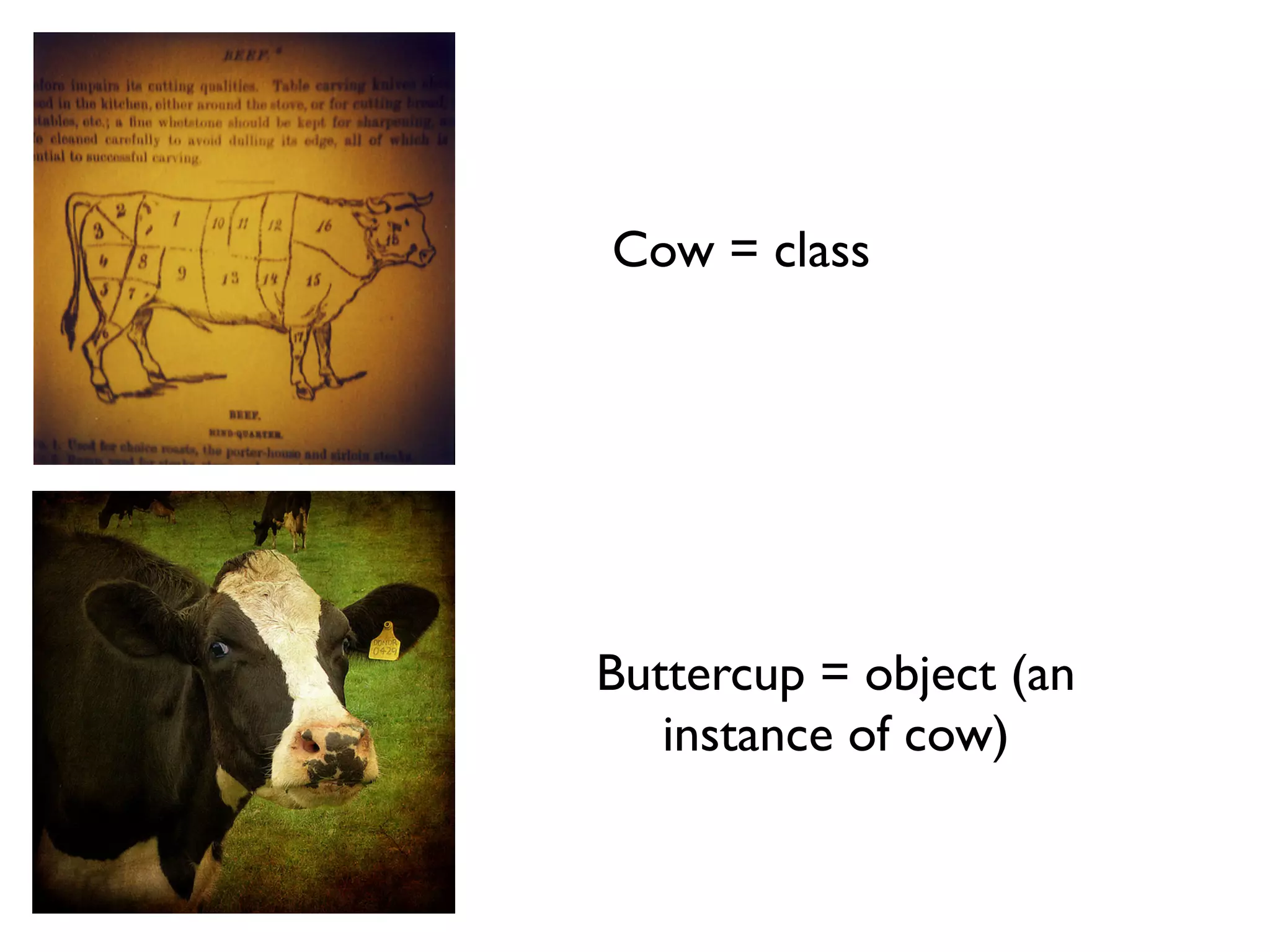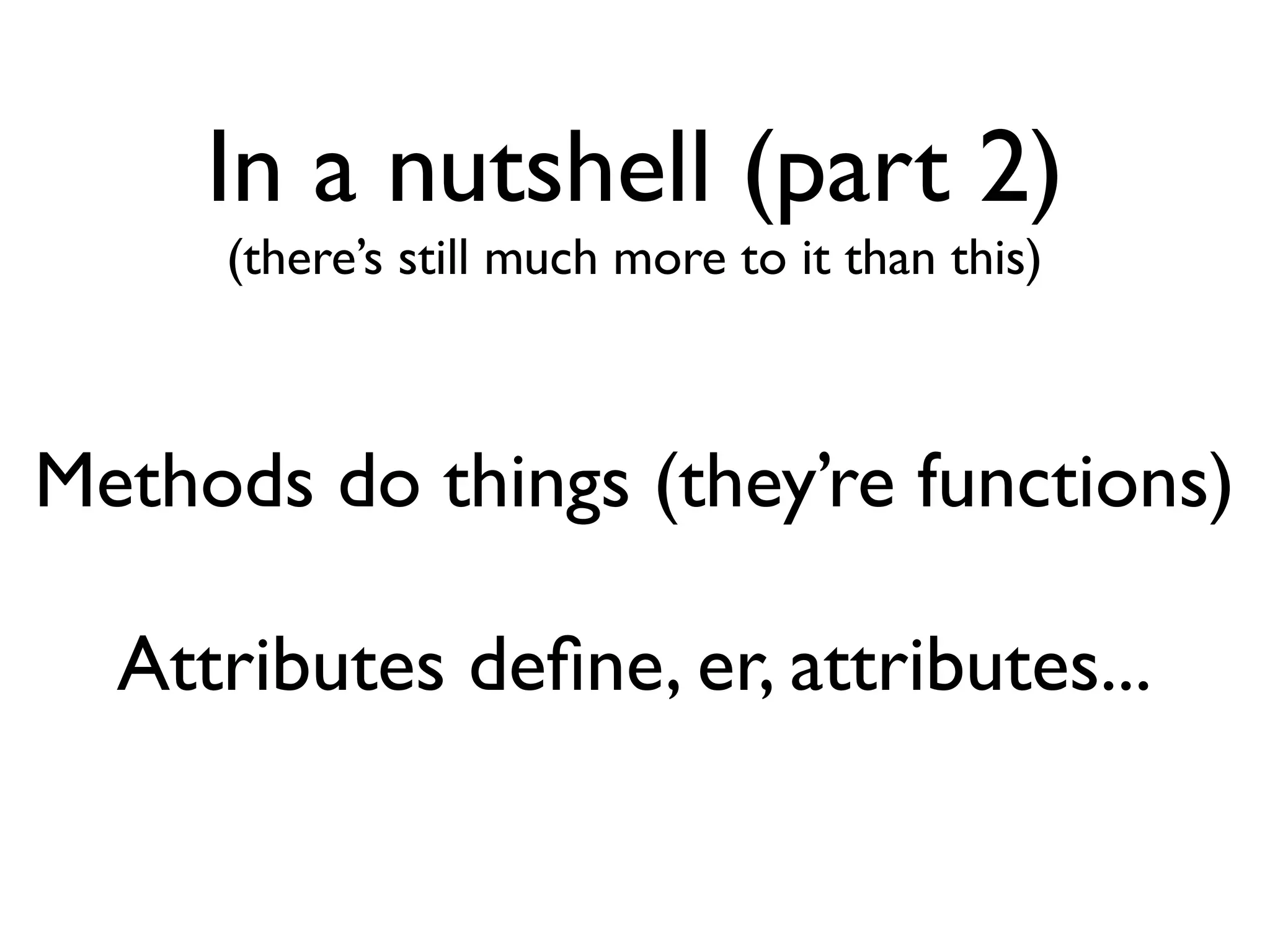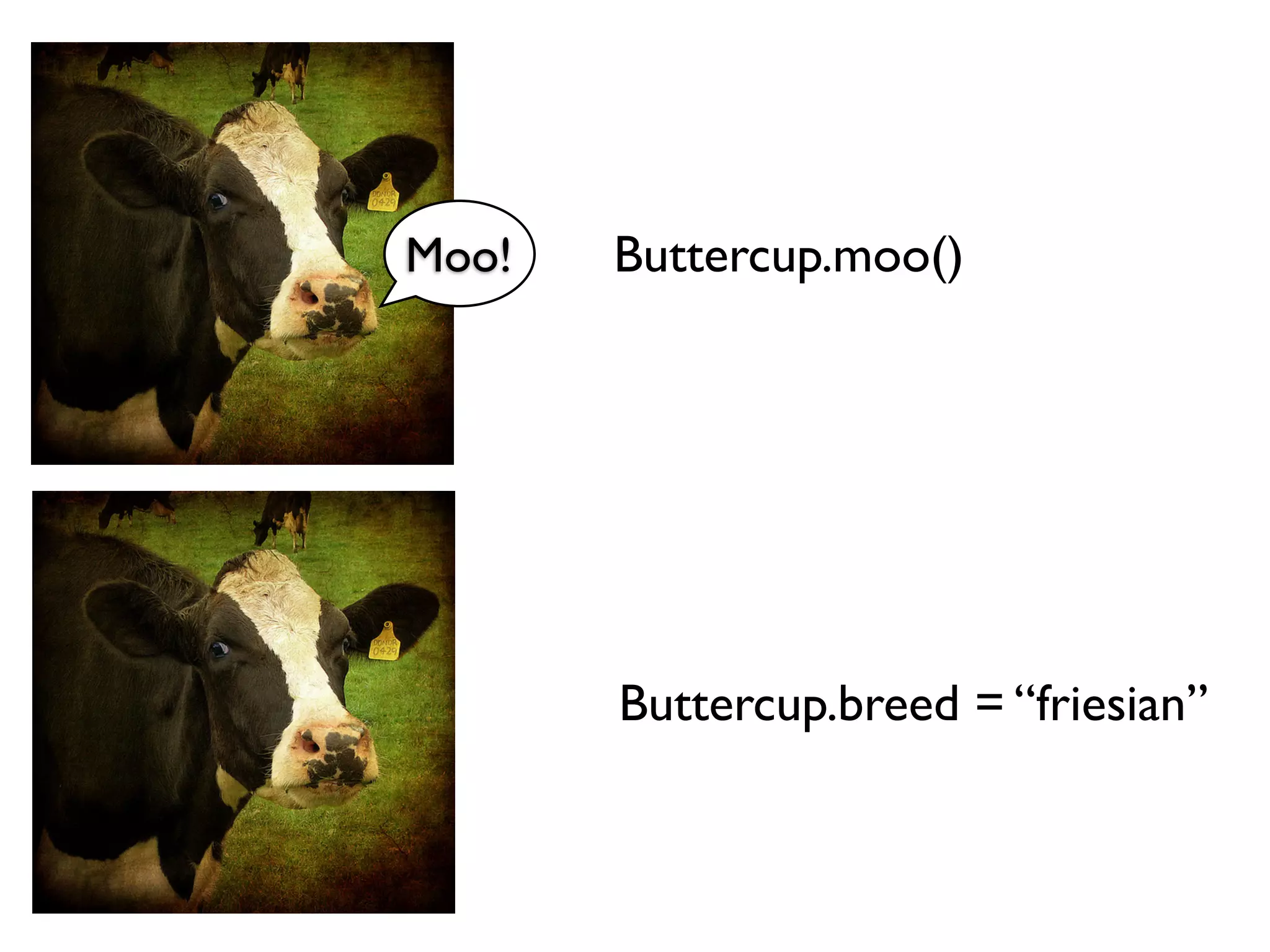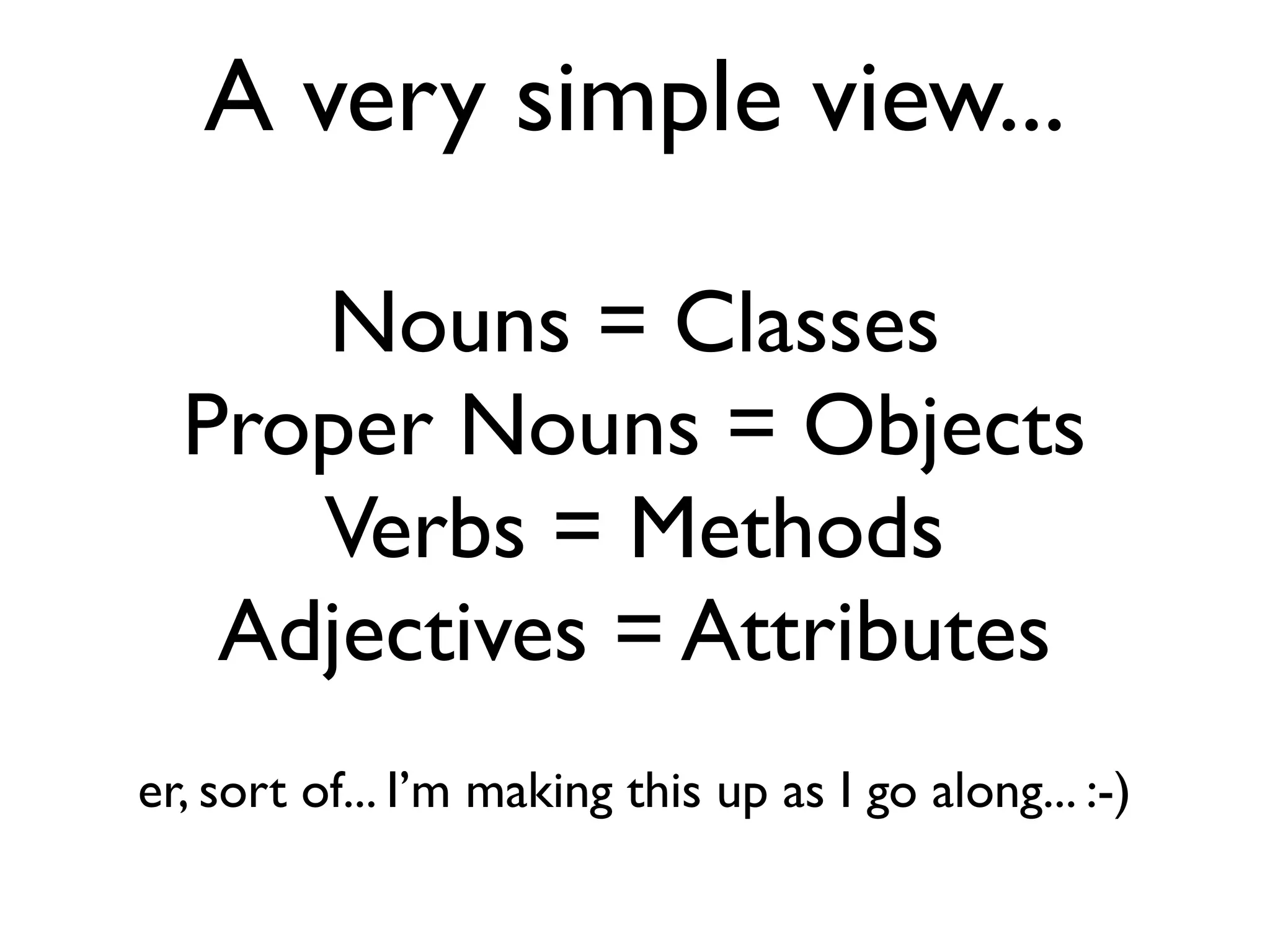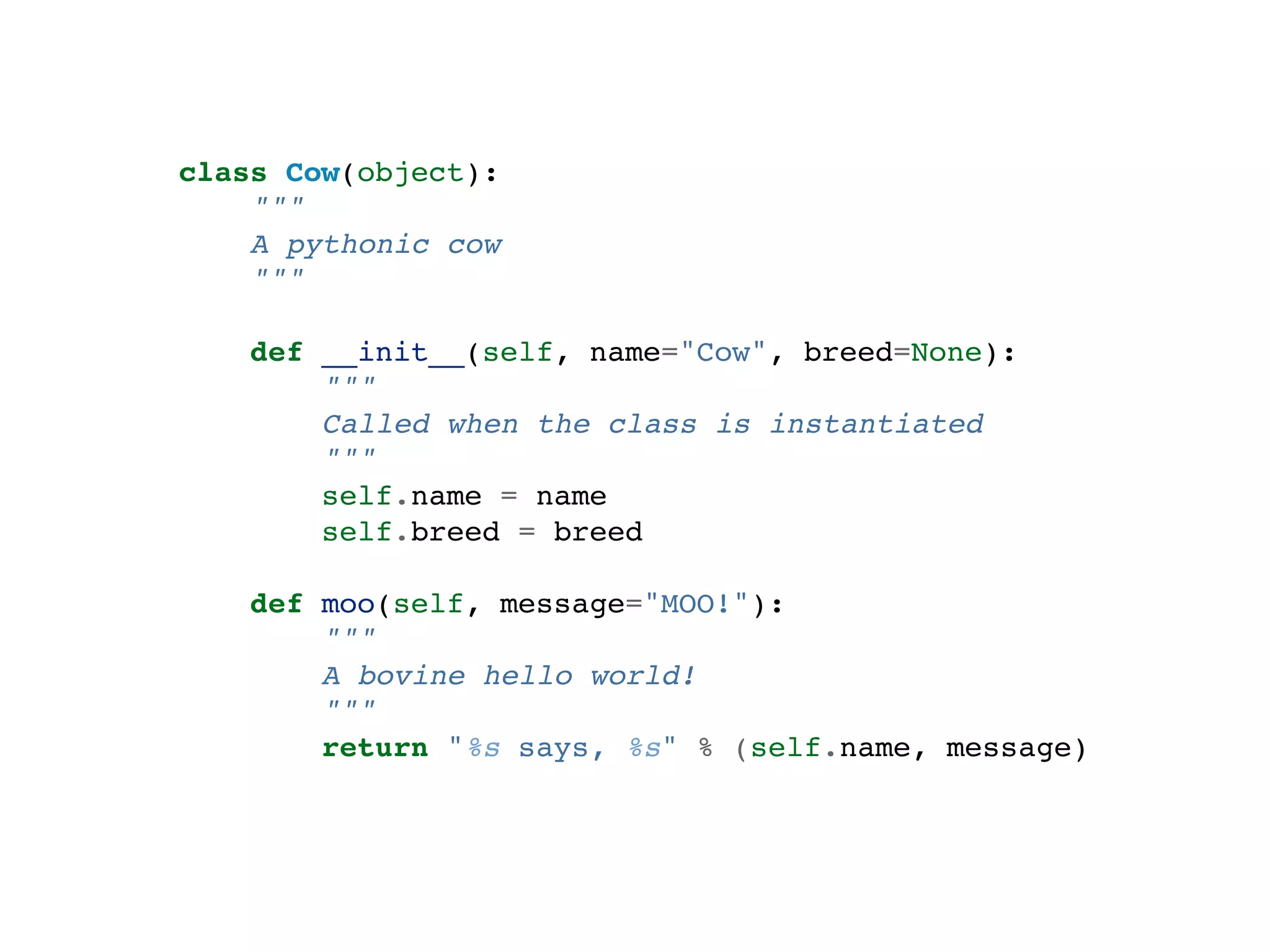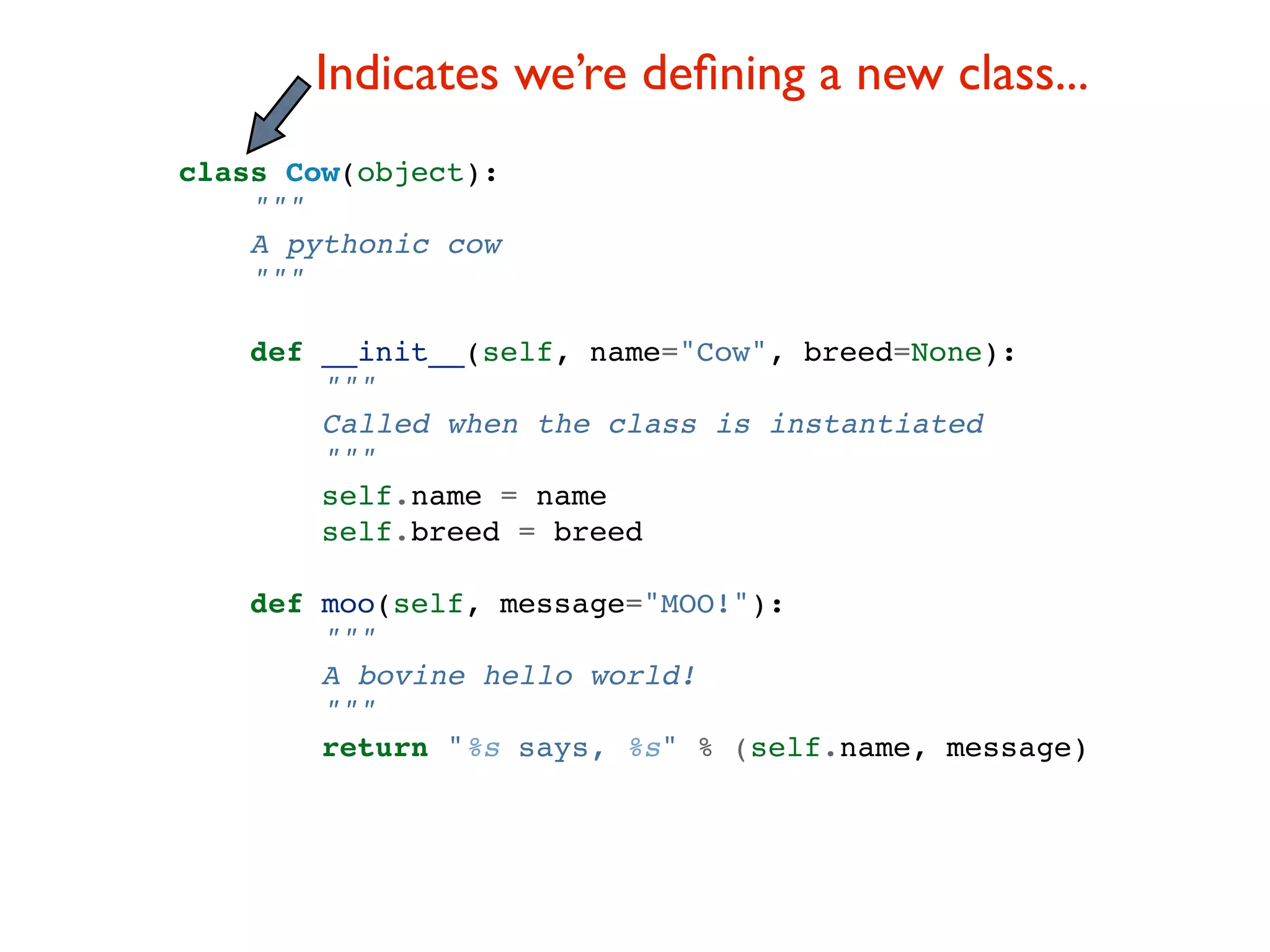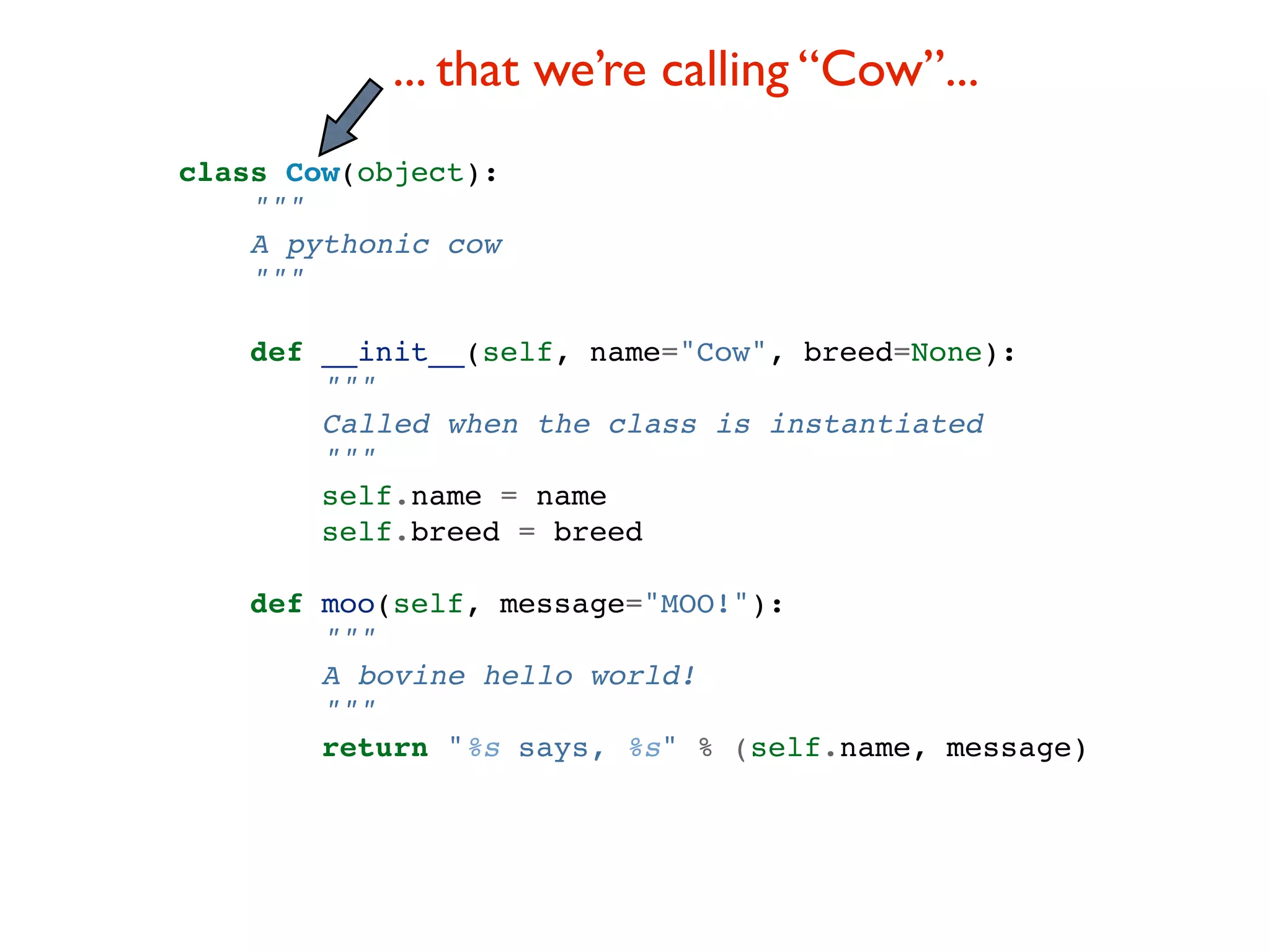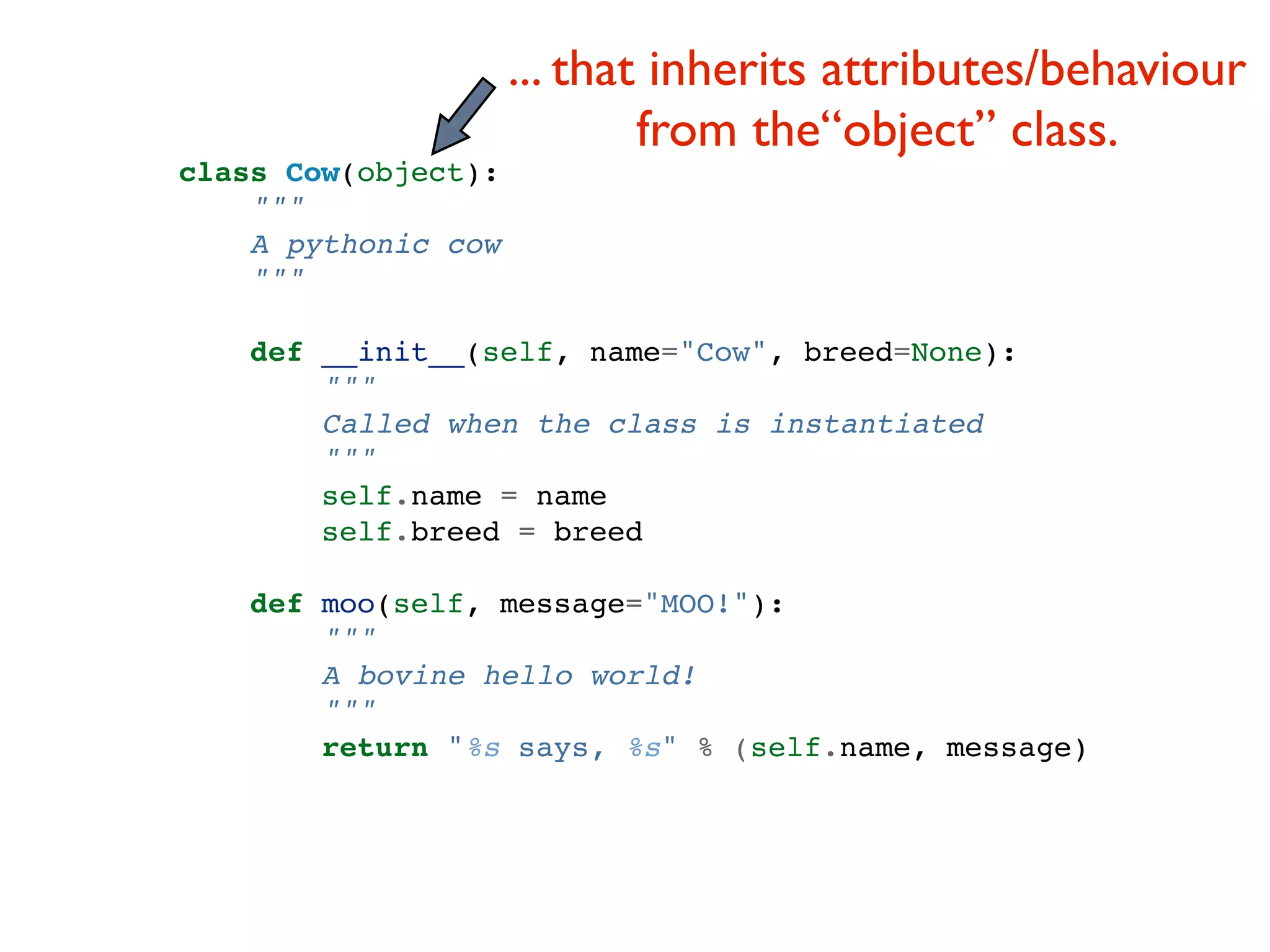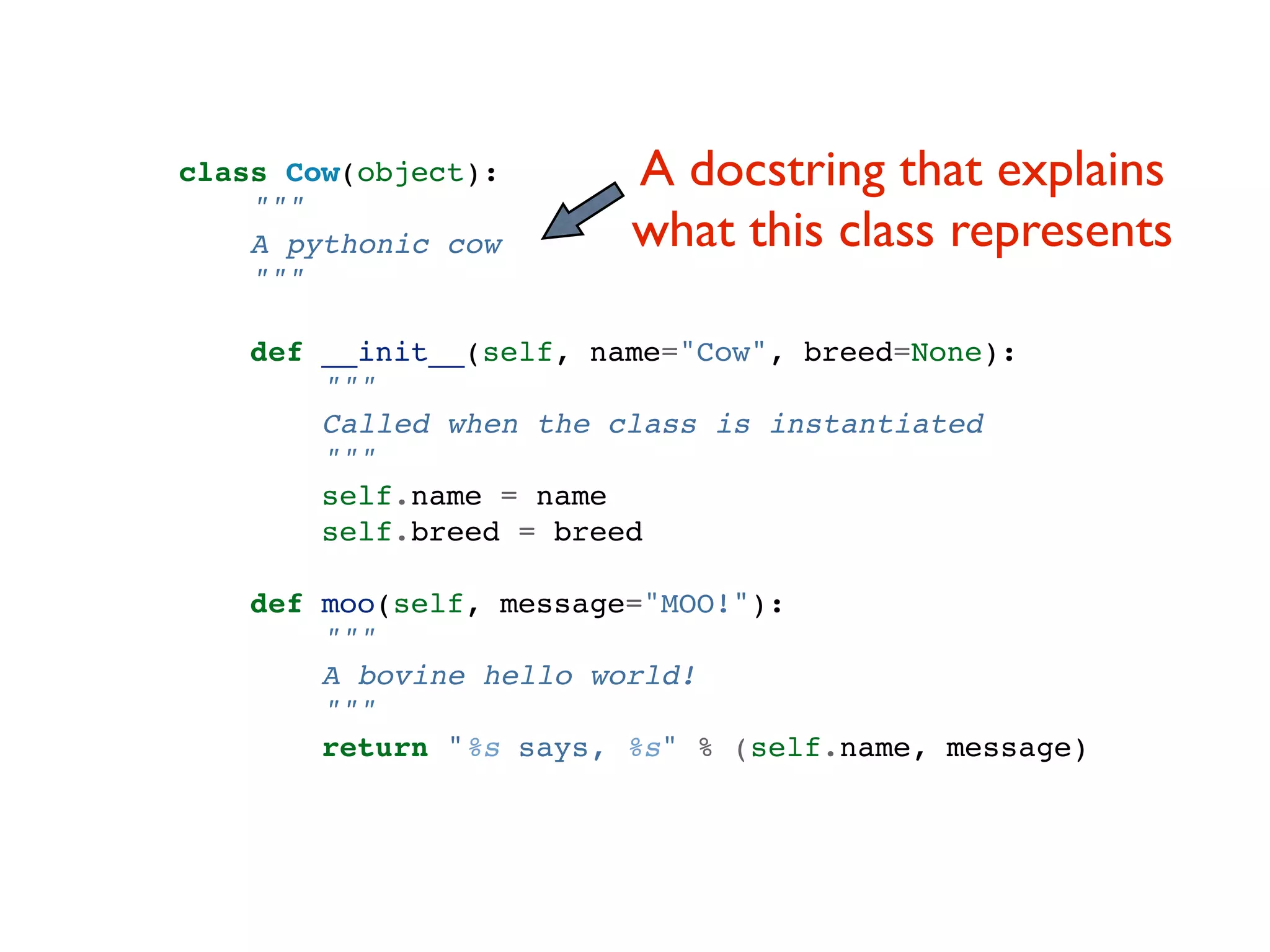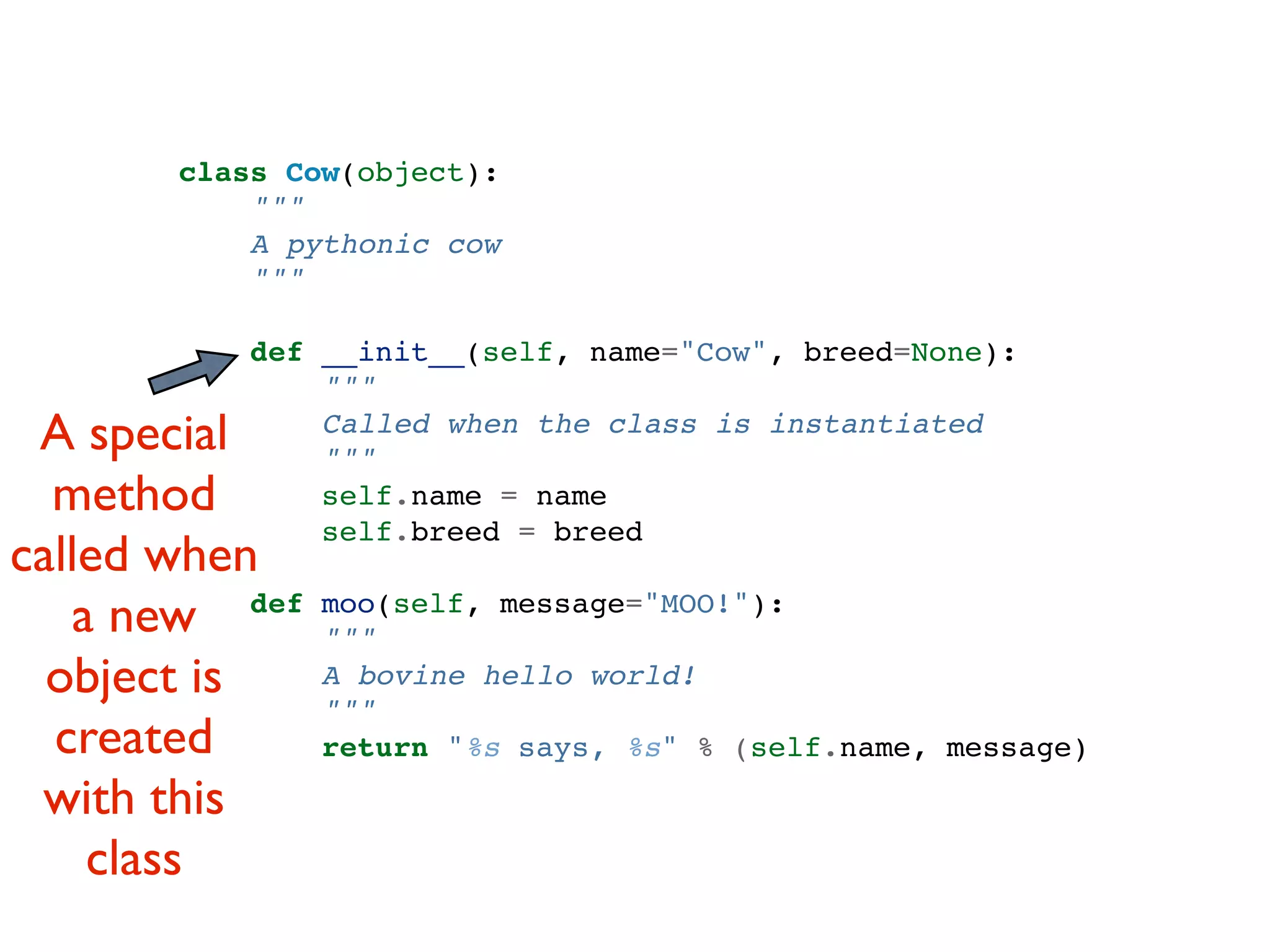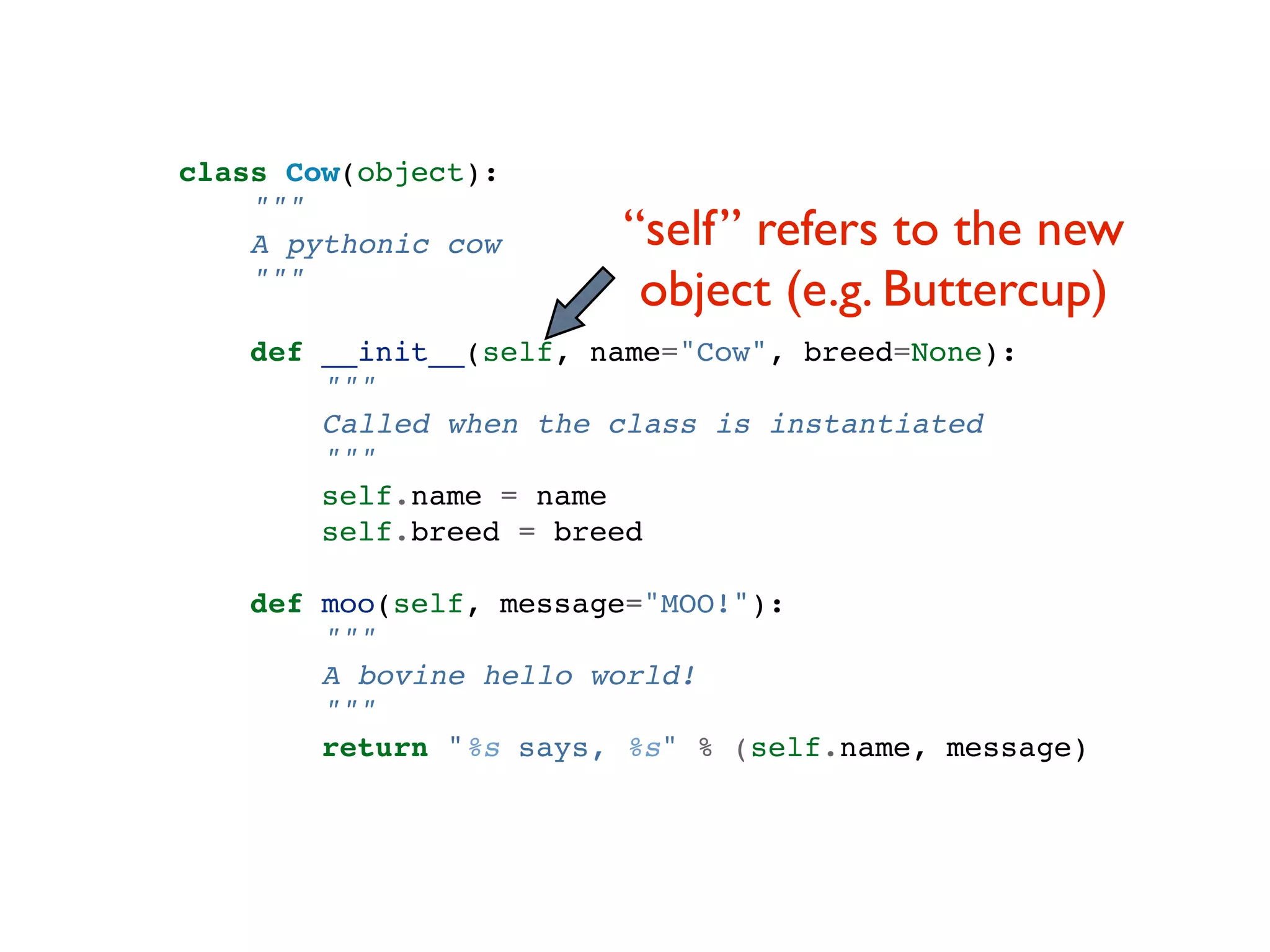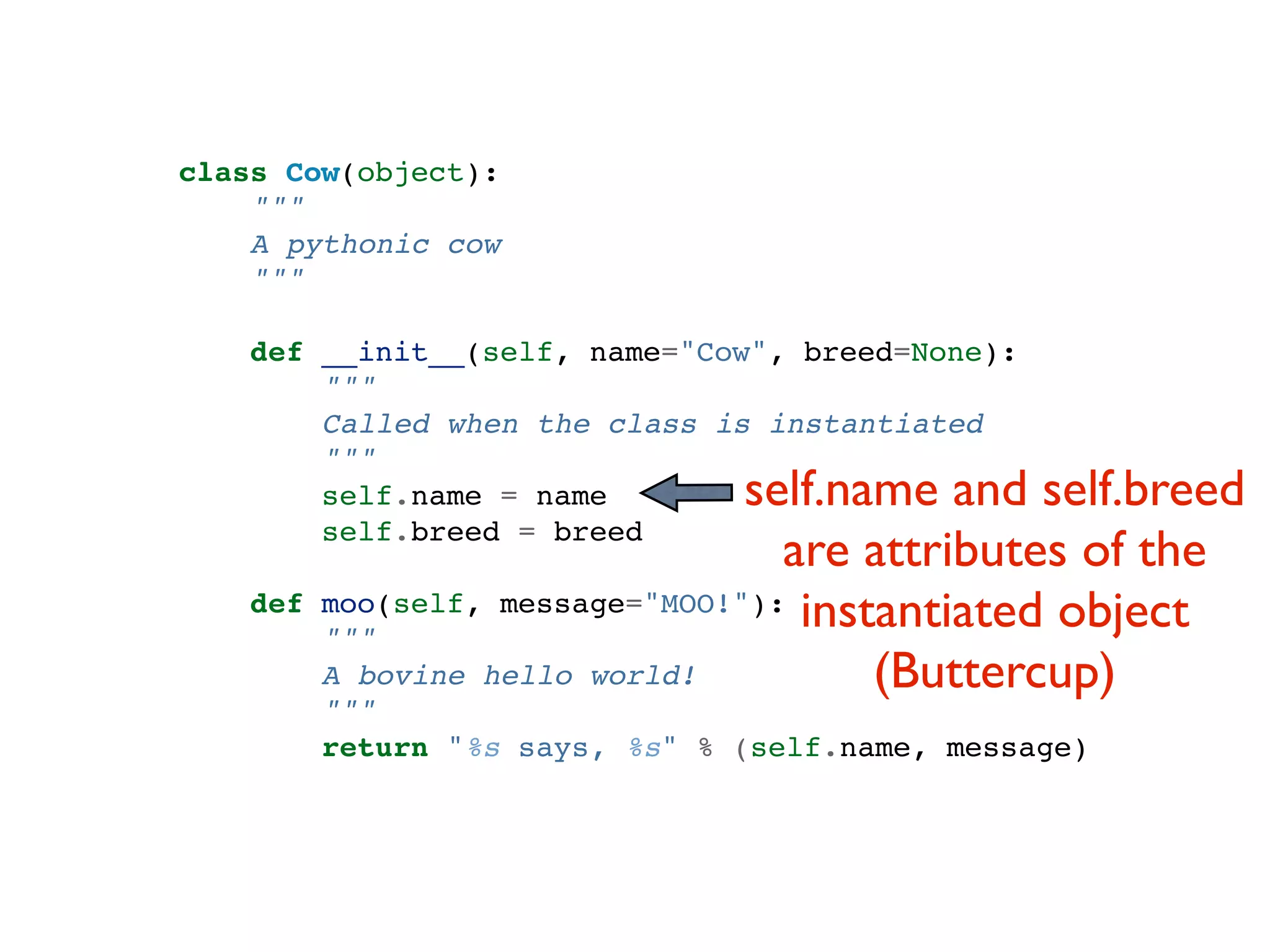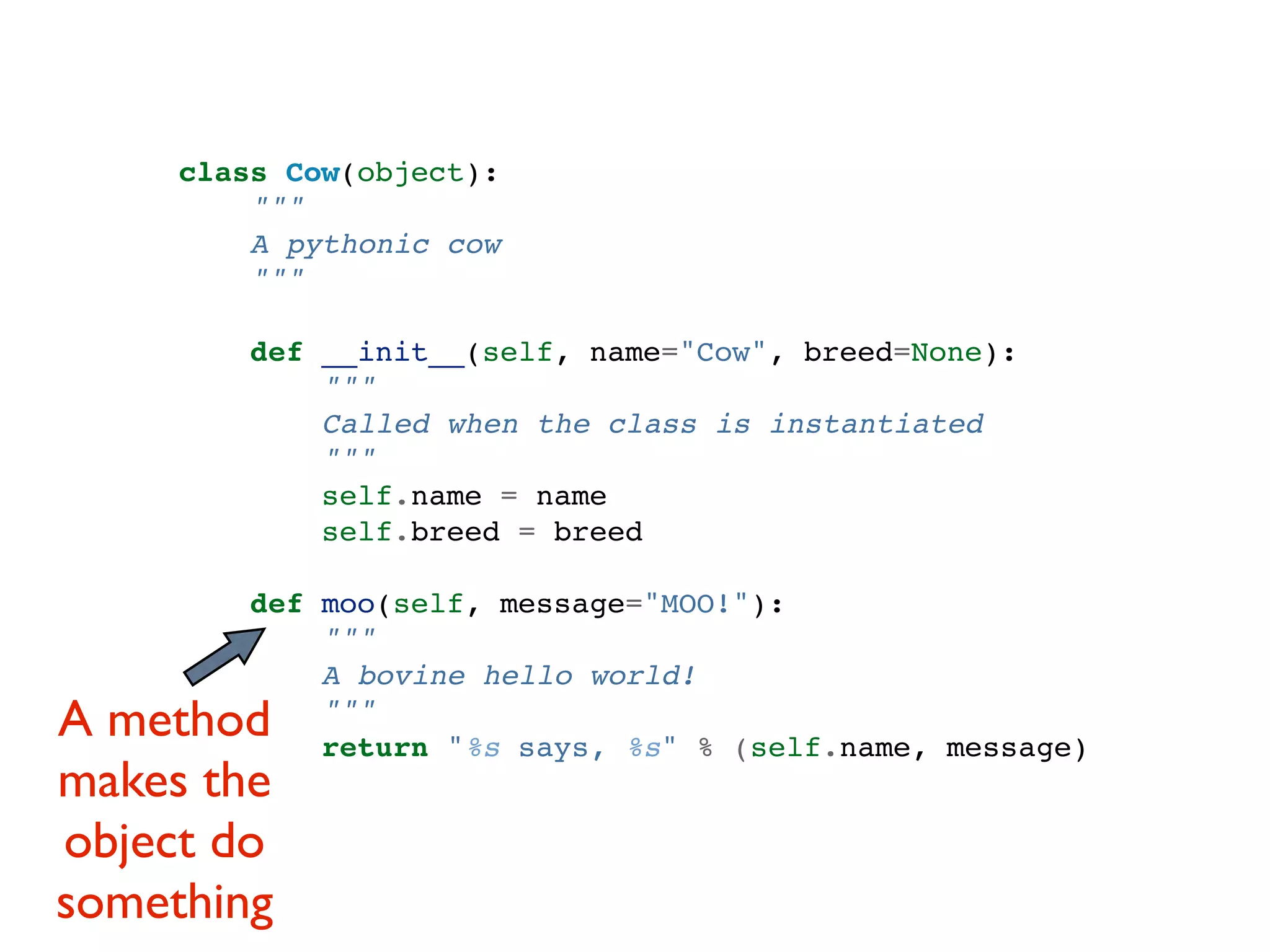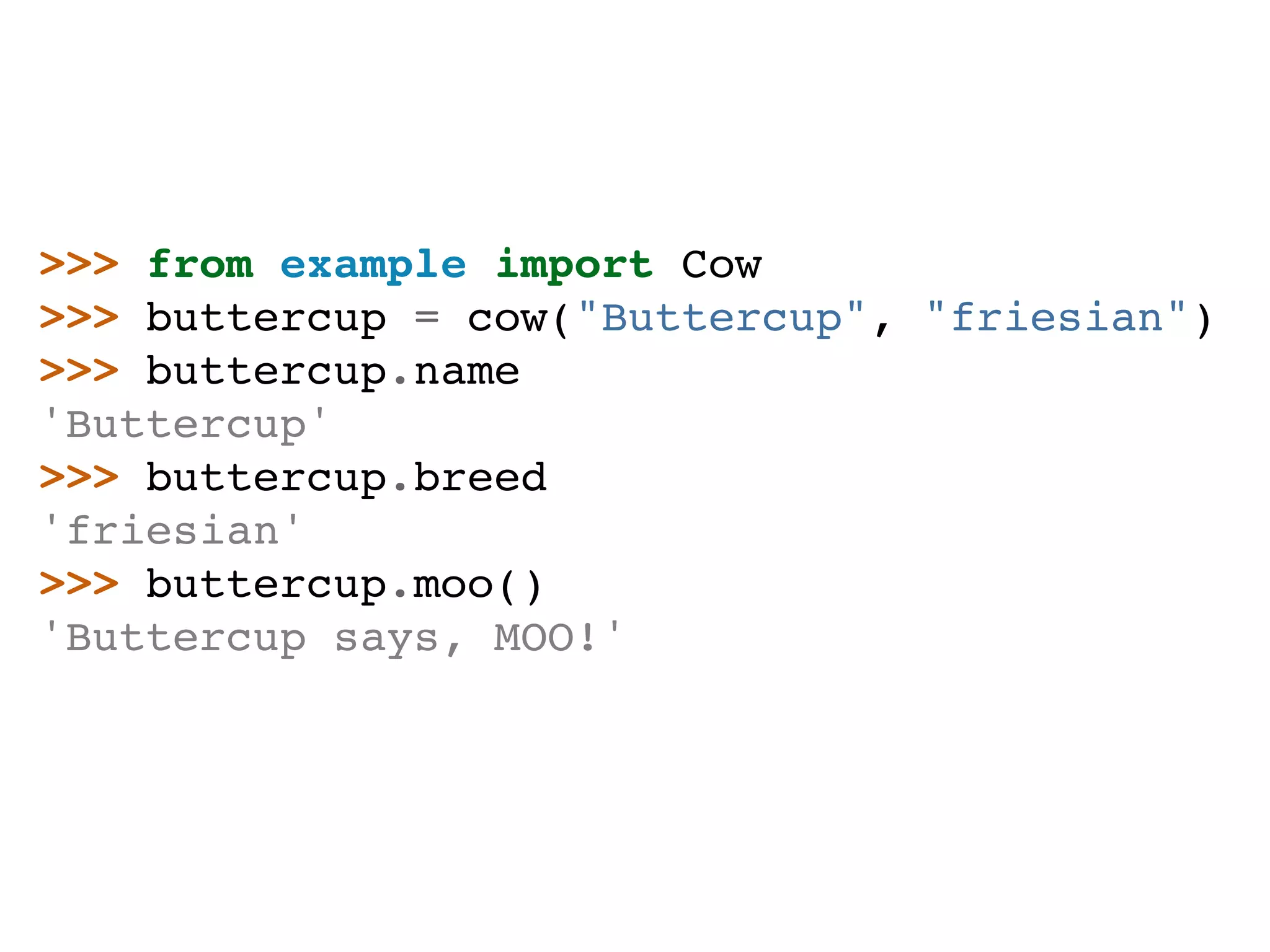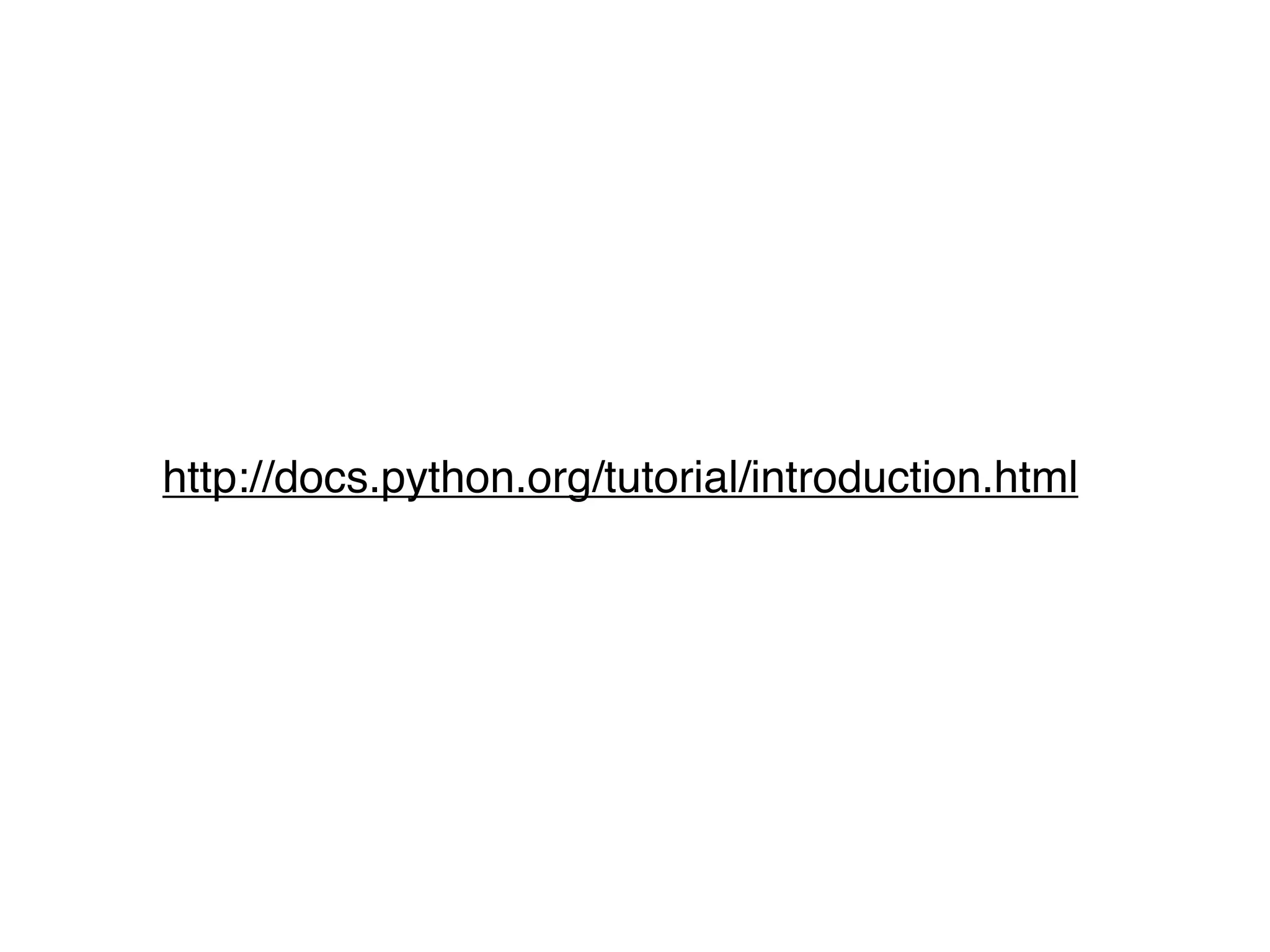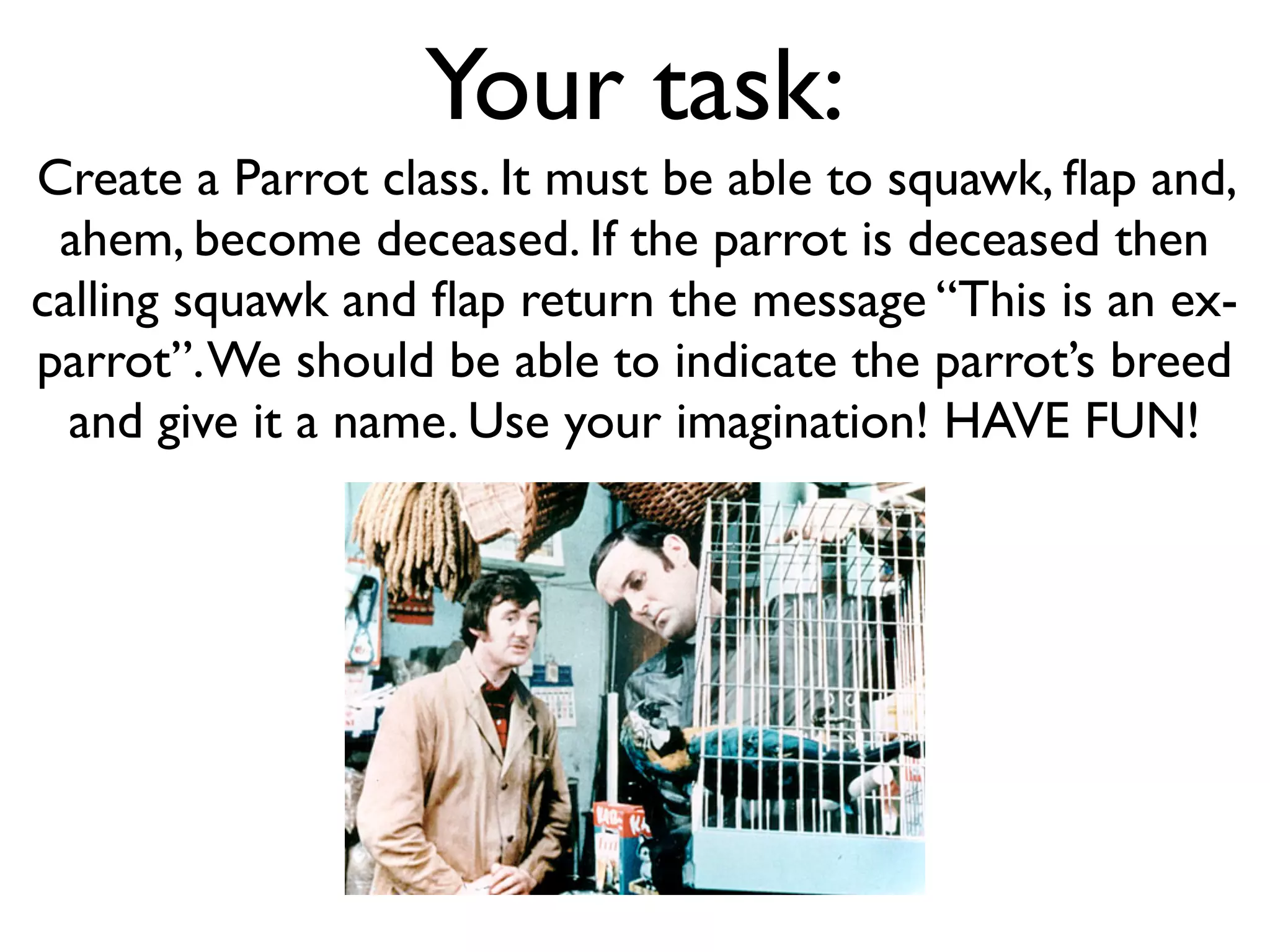The document provides an introduction to Python programming concepts including functions, variables, data types, conditionals, loops, and data structures. It demonstrates a simple "Hello, World!" function and how to define, call, and assign the return value of functions. It also shows how to check variable types, use if/else conditional logic, iterate with for loops, and define a dictionary with nested data. The document uses examples and commentary to explain Python syntax and programming concepts in a beginner-friendly manner.
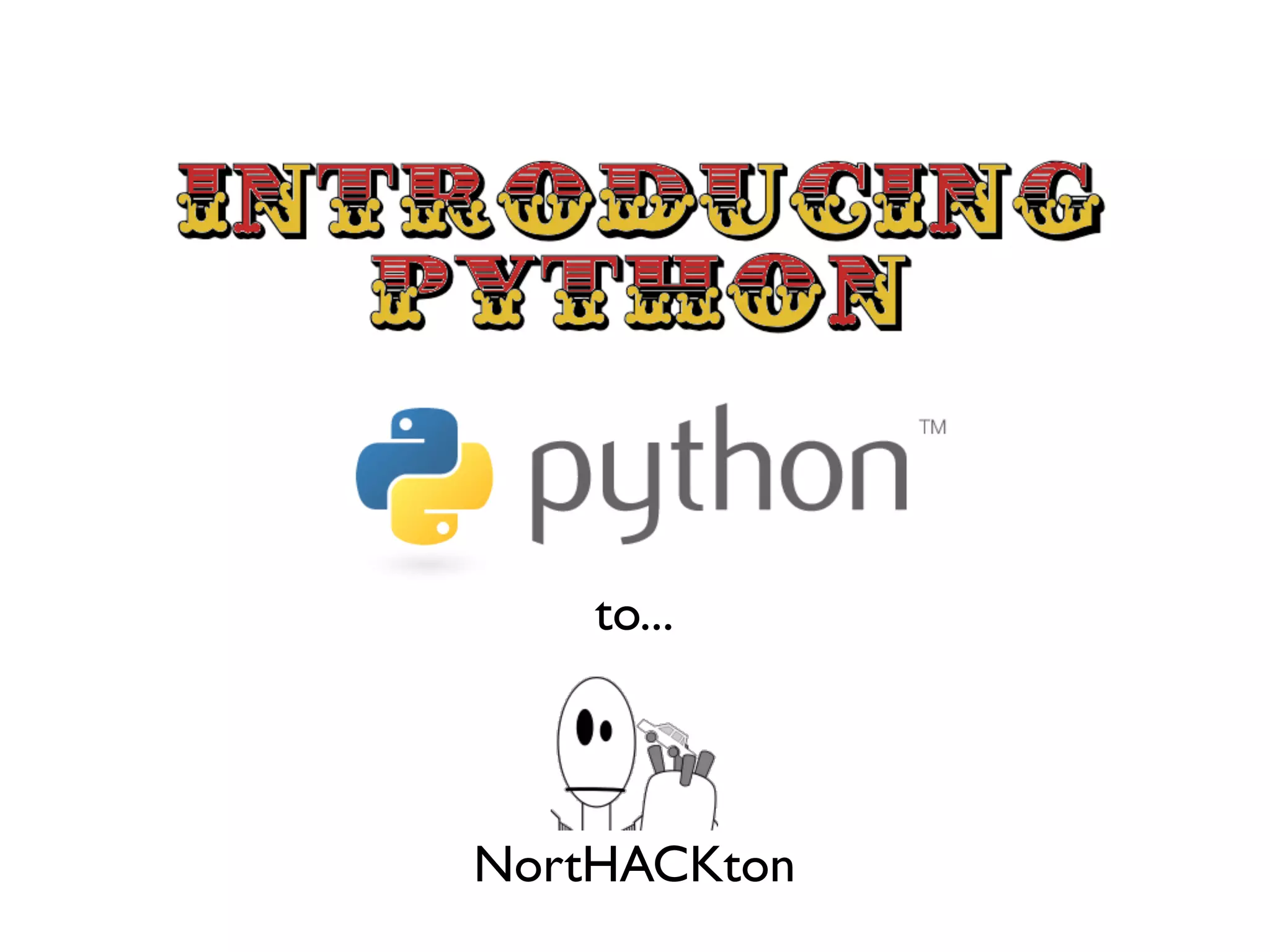


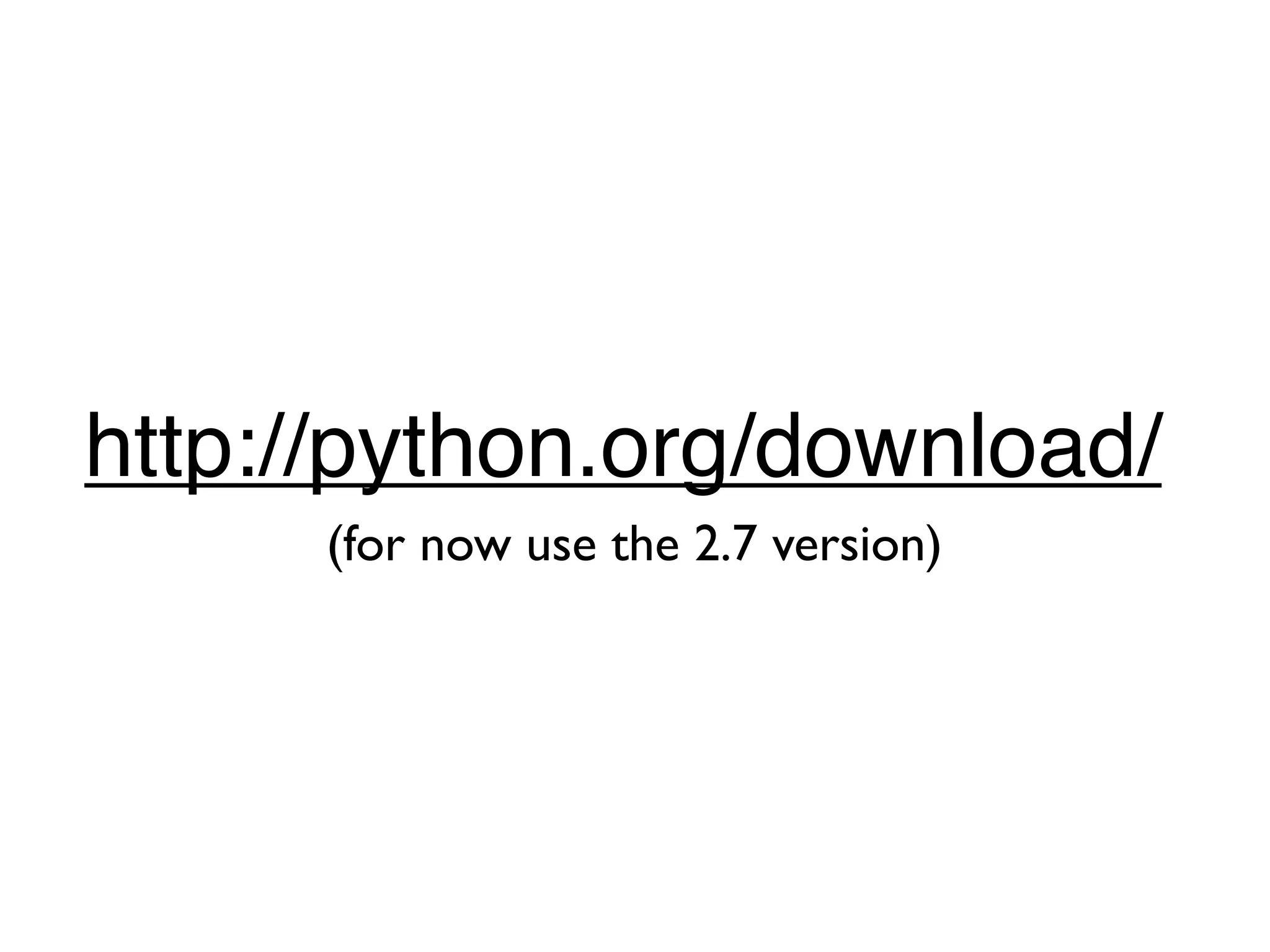
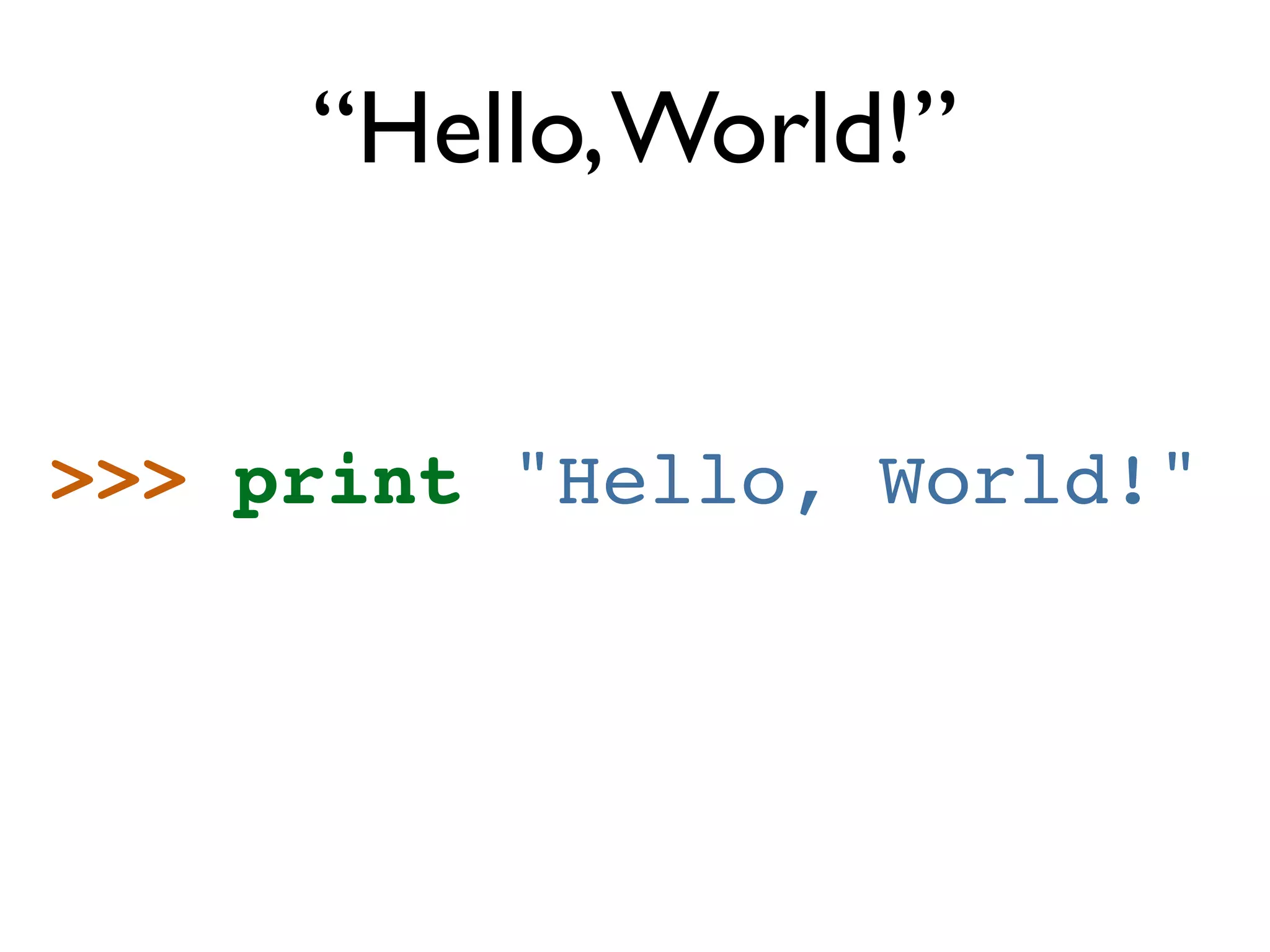
![“Hello, World!” $ python Python 2.6.1 (r261:67515, Jun 24 2010, 21:47:49) [GCC 4.2.1 (Apple Inc. build 5646)] on darwin Type "help", "copyright", "credits" or "license" for more information. >>> print "Hello, World!" Hello, World!](https://image.slidesharecdn.com/pythonintro-110201082453-phpapp02/75/An-Inaccurate-Introduction-to-Python-6-2048.jpg)
![“Hello, World!” Start the Python interpreter $ python from the command line Python 2.6.1 (r261:67515, Jun 24 2010, 21:47:49) [GCC 4.2.1 (Apple Inc. build 5646)] on darwin Type "help", "copyright", "credits" or "license" for more information. >>> print "Hello, World!" Hello, World!](https://image.slidesharecdn.com/pythonintro-110201082453-phpapp02/75/An-Inaccurate-Introduction-to-Python-7-2048.jpg)
![“Hello, World!” $ python Python 2.6.1 (r261:67515, Jun 24 2010, 21:47:49) [GCC 4.2.1 (Apple Inc. build 5646)] on darwin Type "help", "copyright", "credits" or "license" for more information. >>> print "Hello, World!" Hello, World! Generic information about the Python interpreter.](https://image.slidesharecdn.com/pythonintro-110201082453-phpapp02/75/An-Inaccurate-Introduction-to-Python-8-2048.jpg)
![“Hello, World!” $ python Python 2.6.1 (r261:67515, Jun 24 2010, 21:47:49) [GCC 4.2.1 (Apple Inc. build 5646)] on darwin Type "help", "copyright", "credits" or "license" for more information. >>> print "Hello, World!" Hello, World! You type this bit...](https://image.slidesharecdn.com/pythonintro-110201082453-phpapp02/75/An-Inaccurate-Introduction-to-Python-9-2048.jpg)
![“Hello, World!” $ python Python 2.6.1 (r261:67515, Jun 24 2010, 21:47:49) [GCC 4.2.1 (Apple Inc. build 5646)] on darwin Type "help", "copyright", "credits" or "license" for more information. >>> print "Hello, World!" Hello, World! Python returns the result (you made that happen!)](https://image.slidesharecdn.com/pythonintro-110201082453-phpapp02/75/An-Inaccurate-Introduction-to-Python-10-2048.jpg)
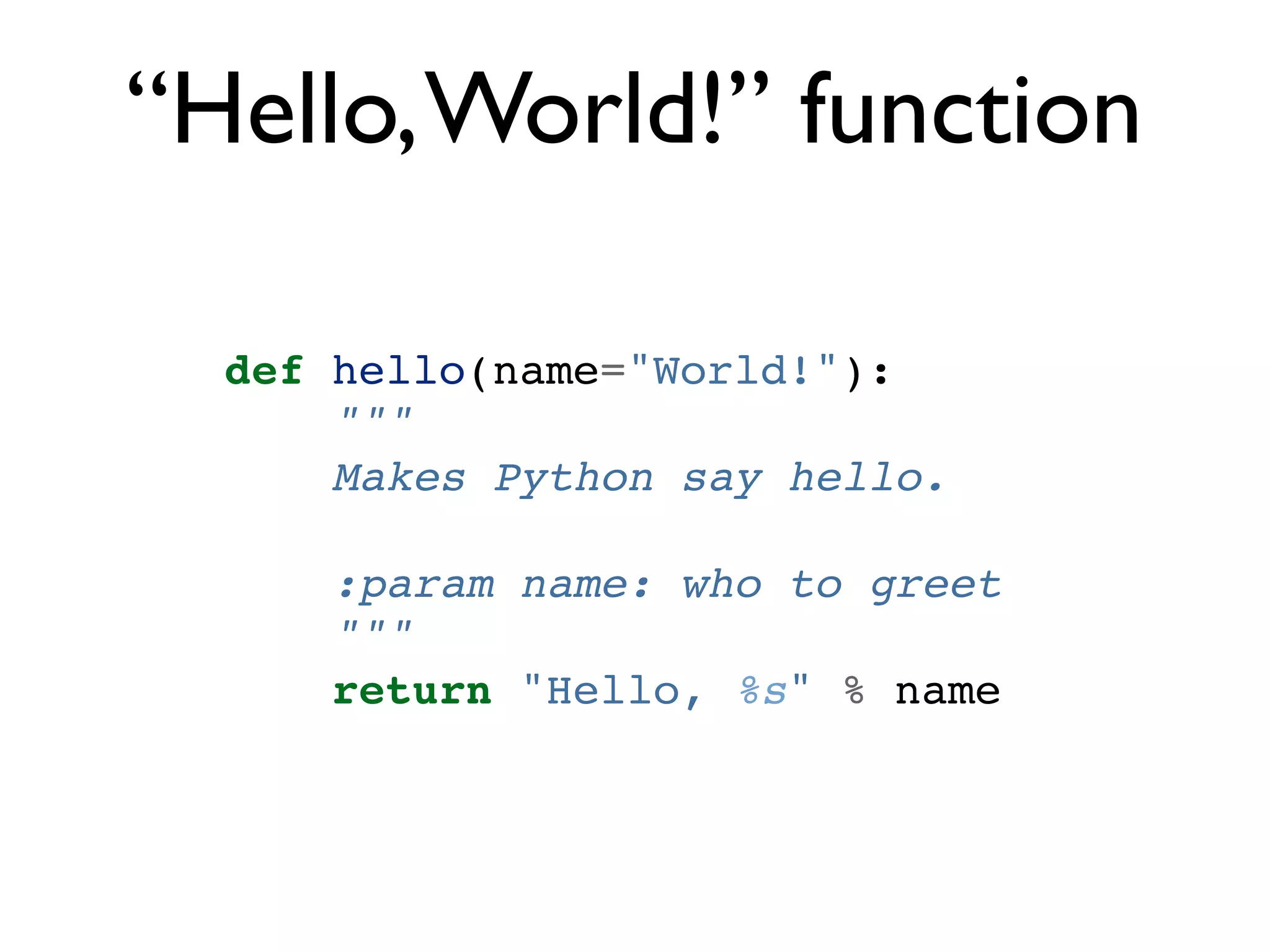
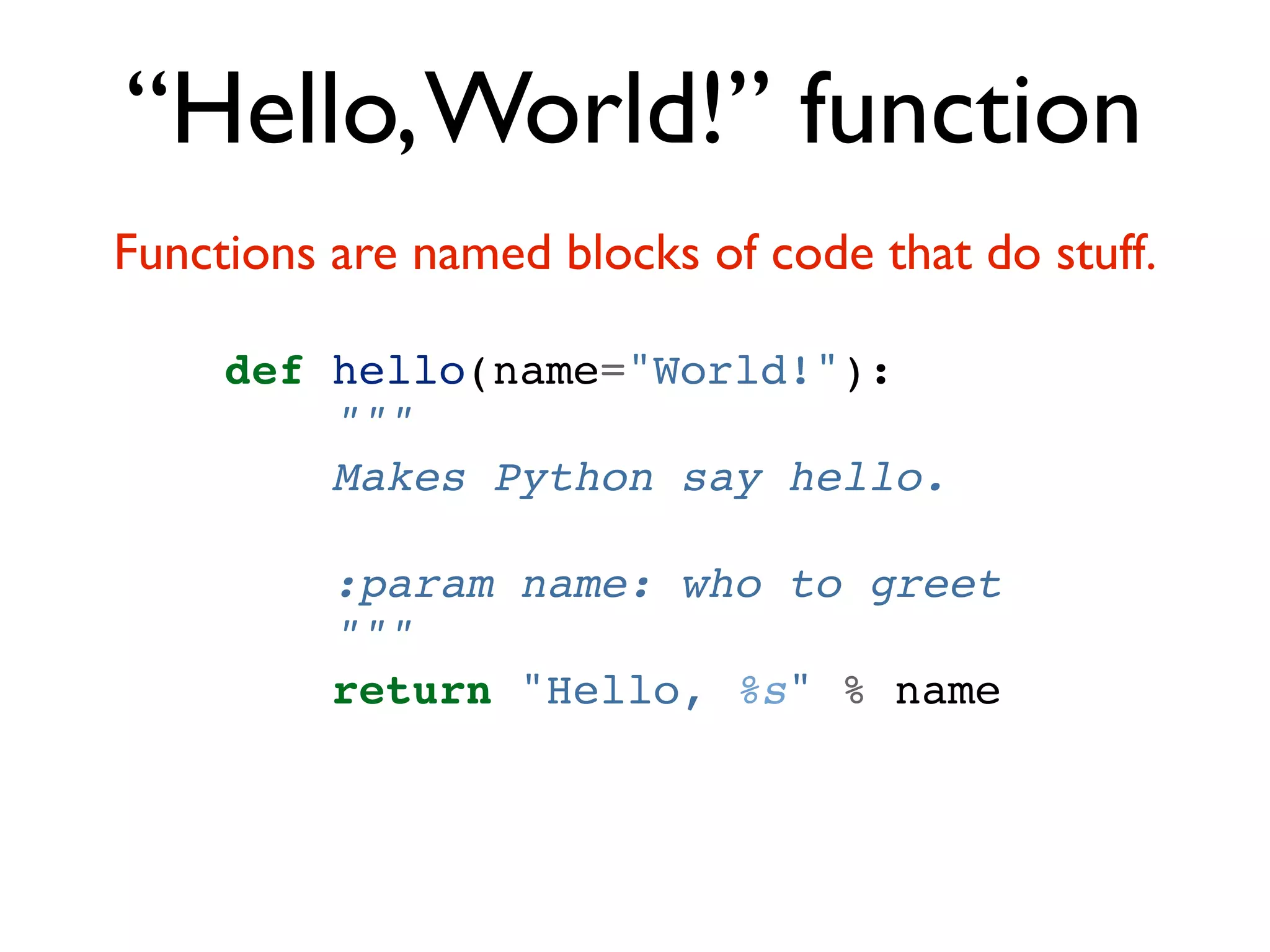
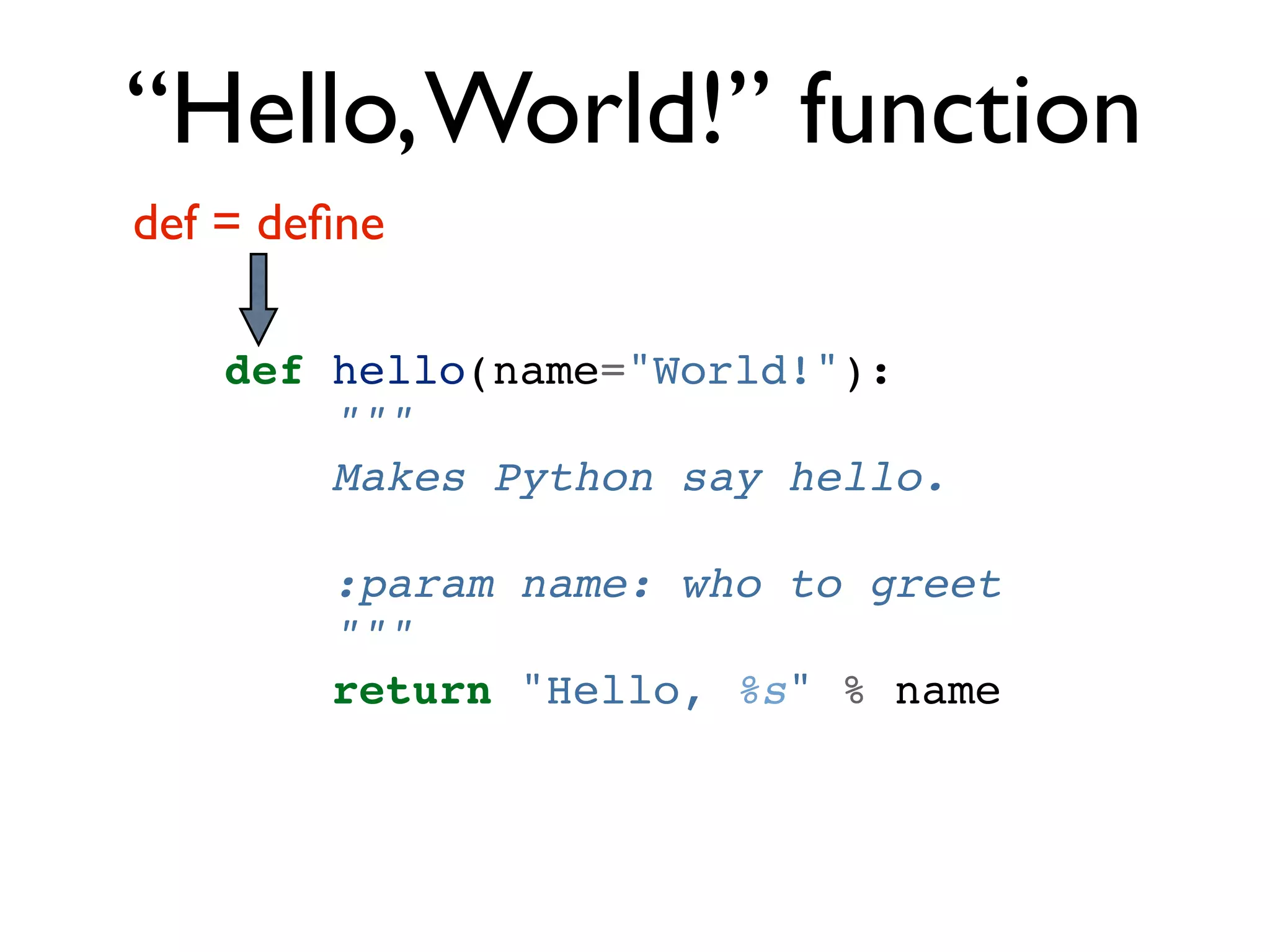
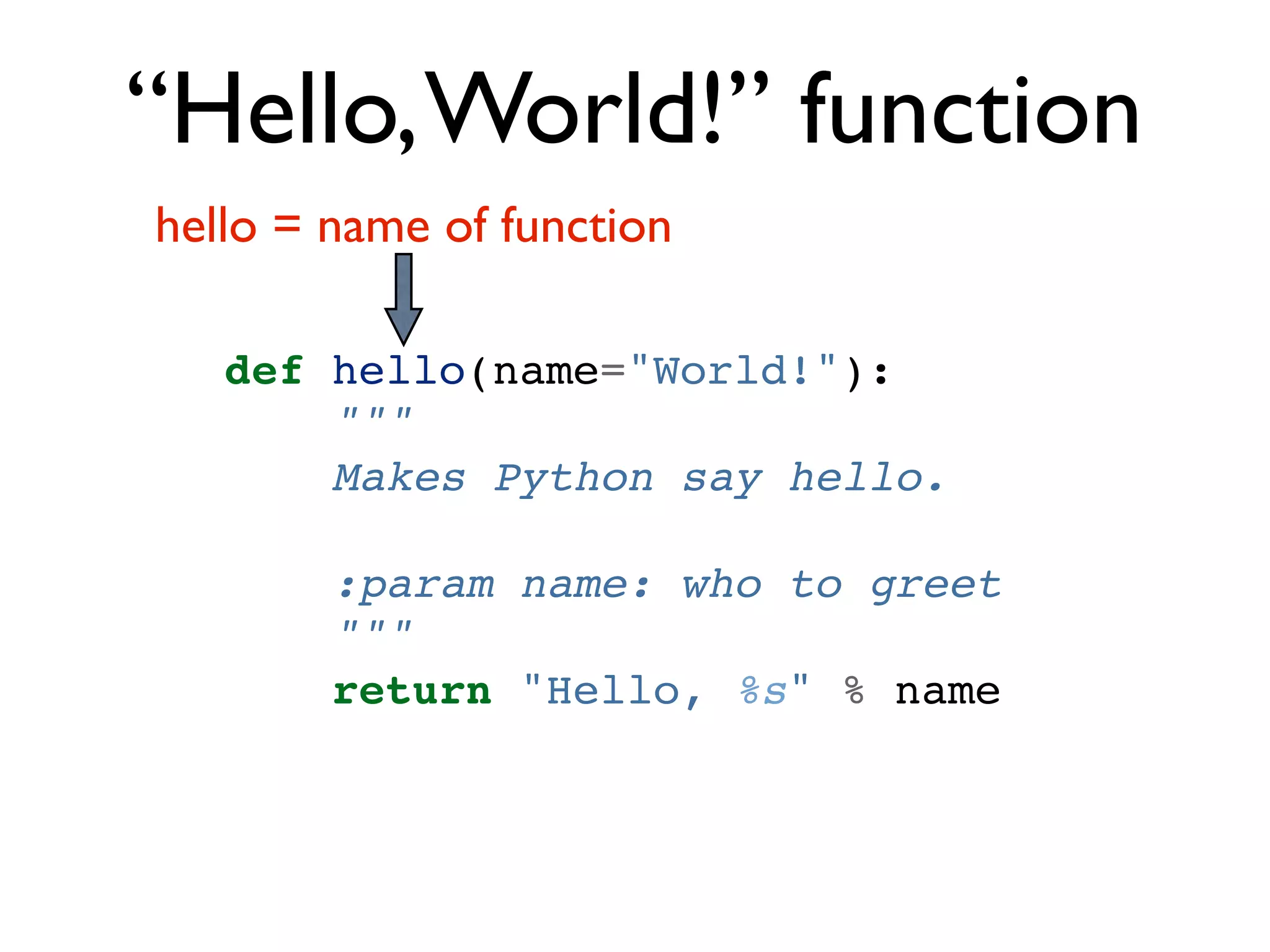
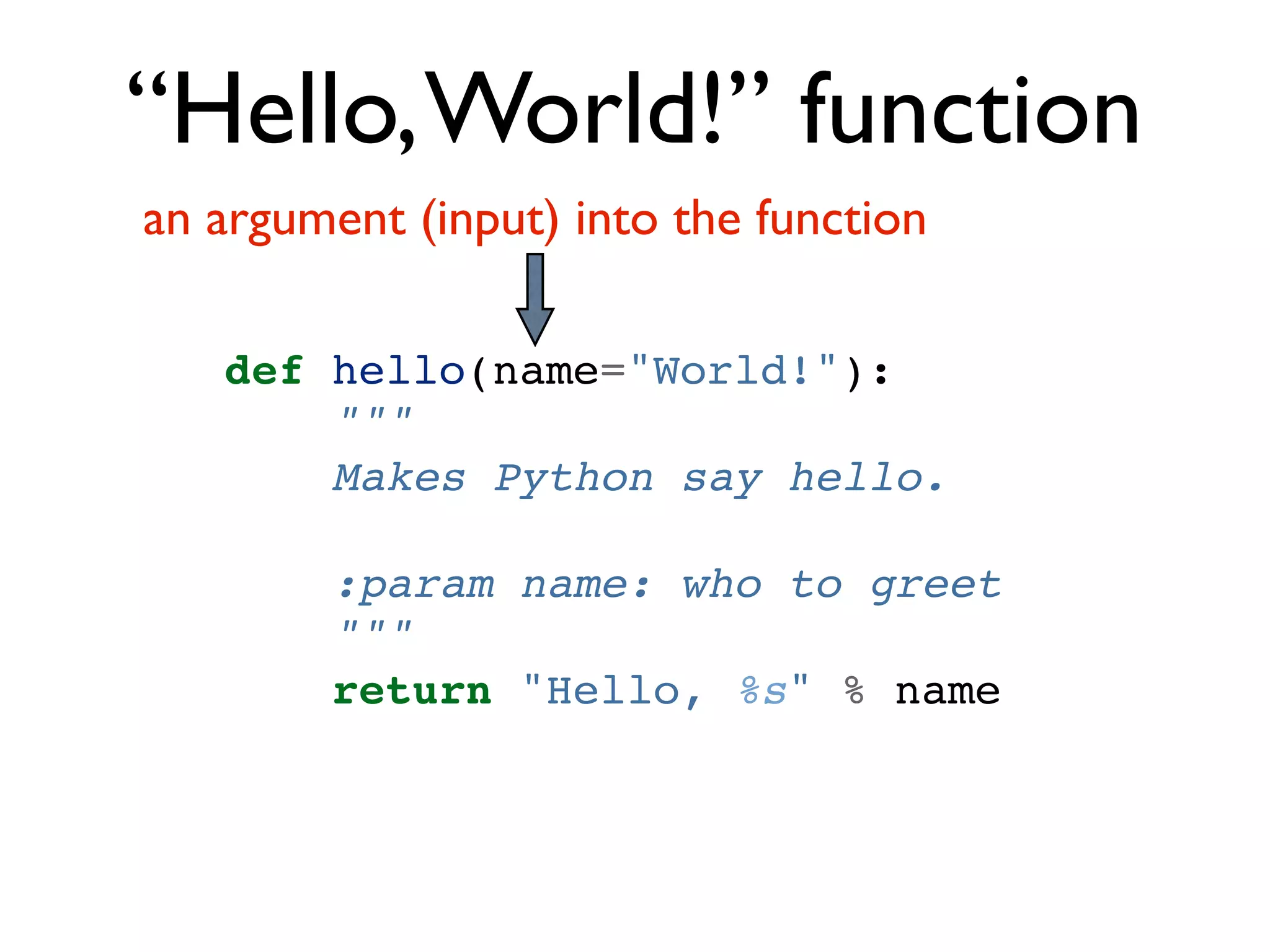
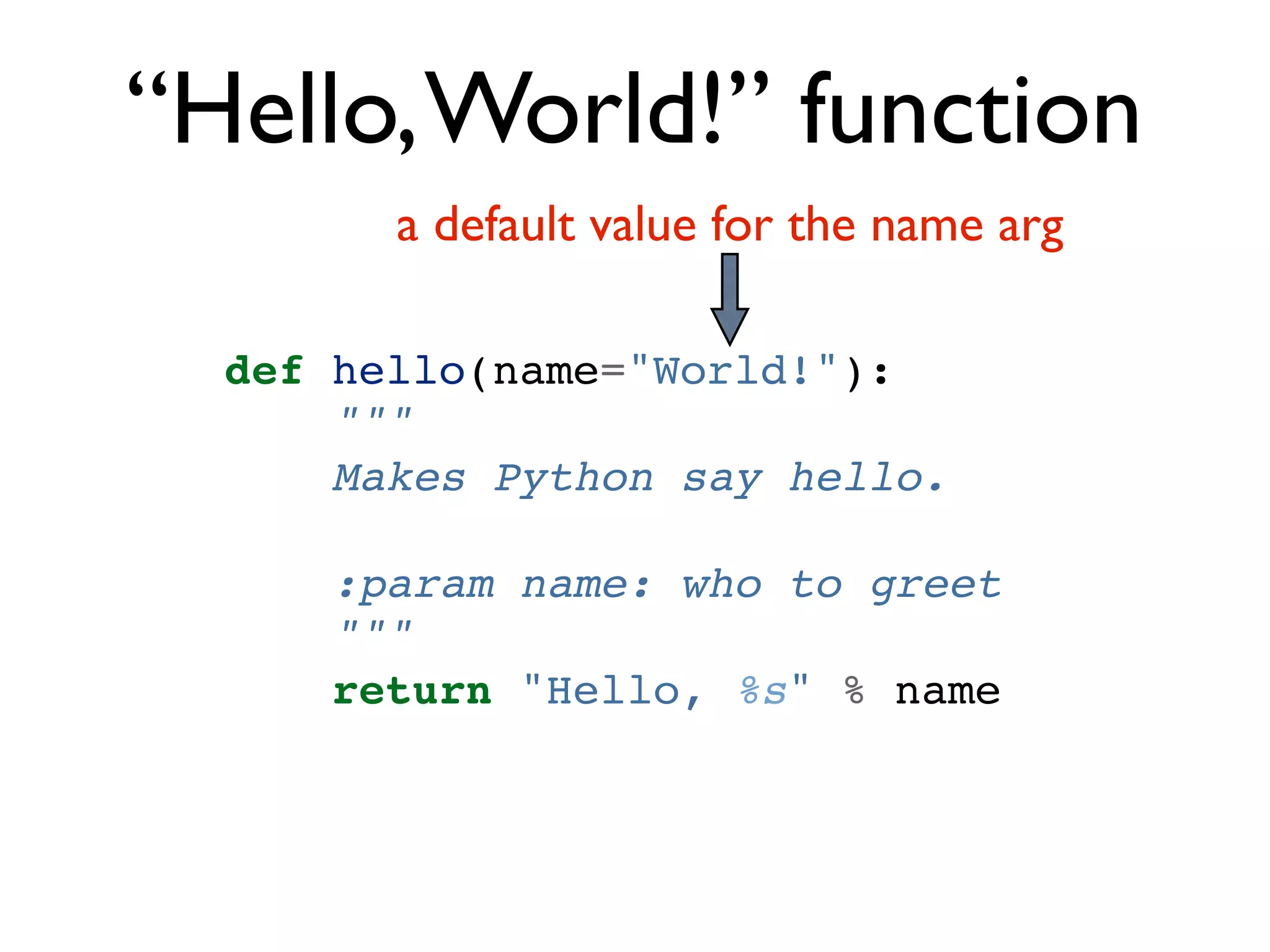
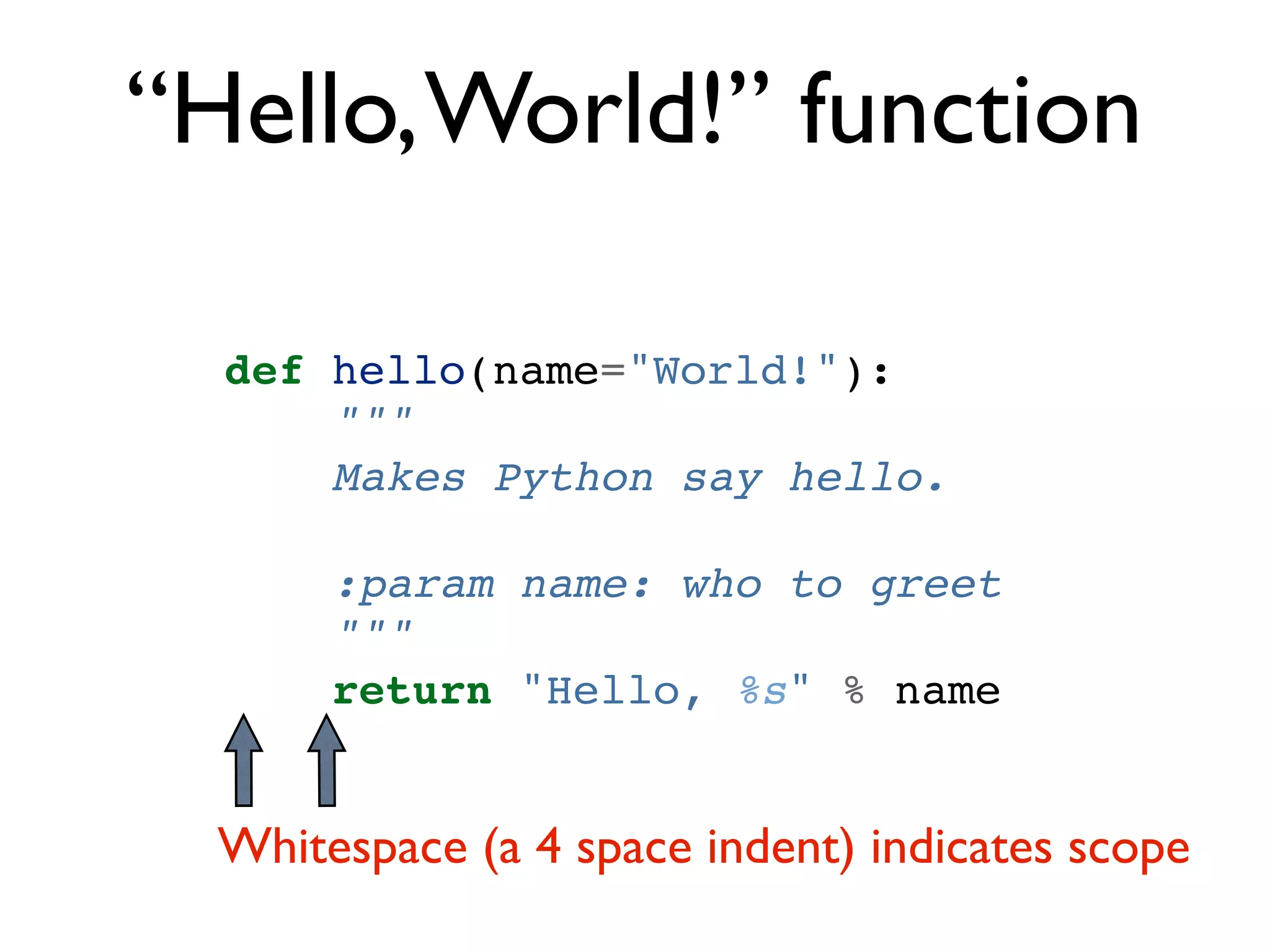
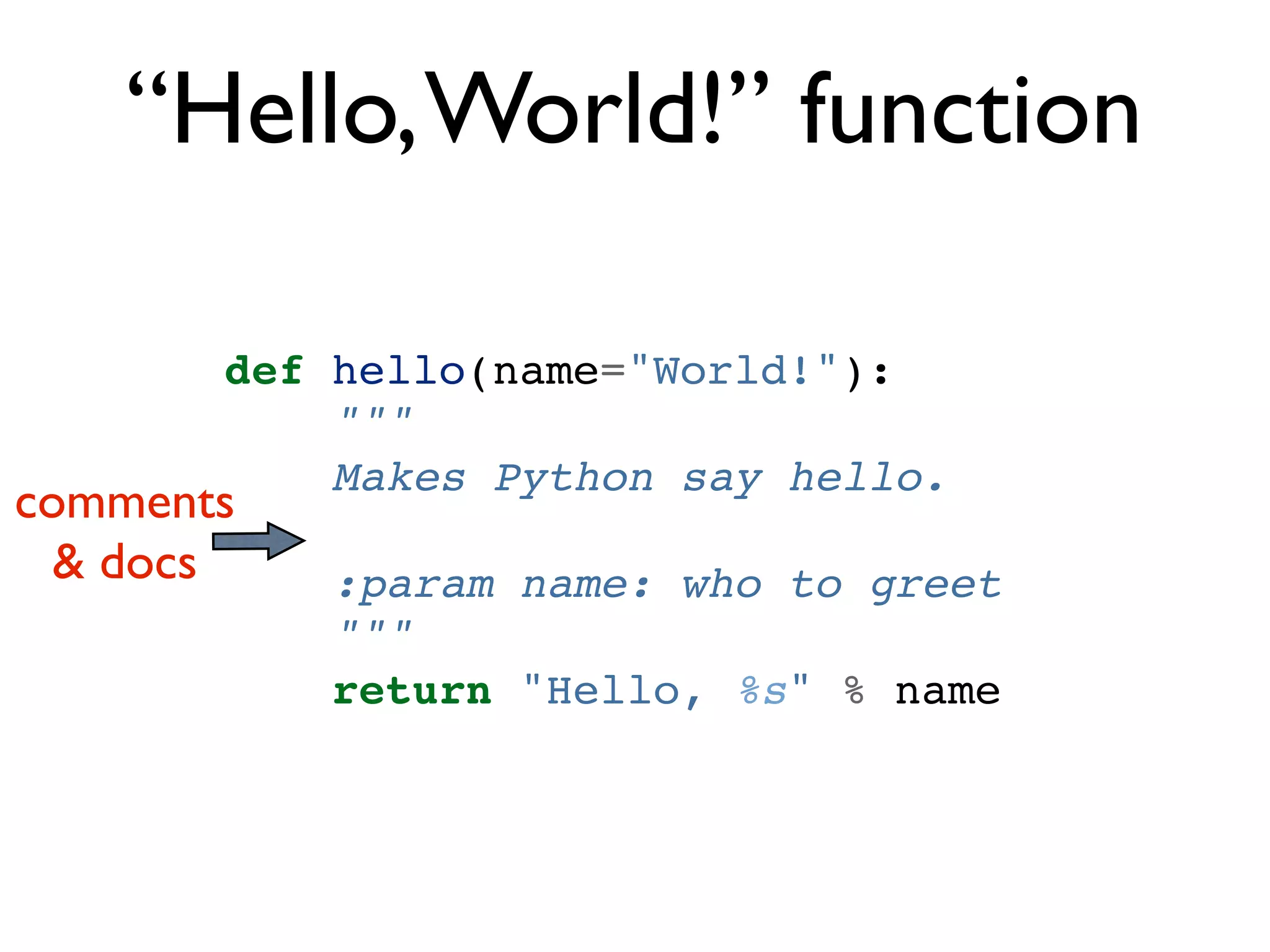
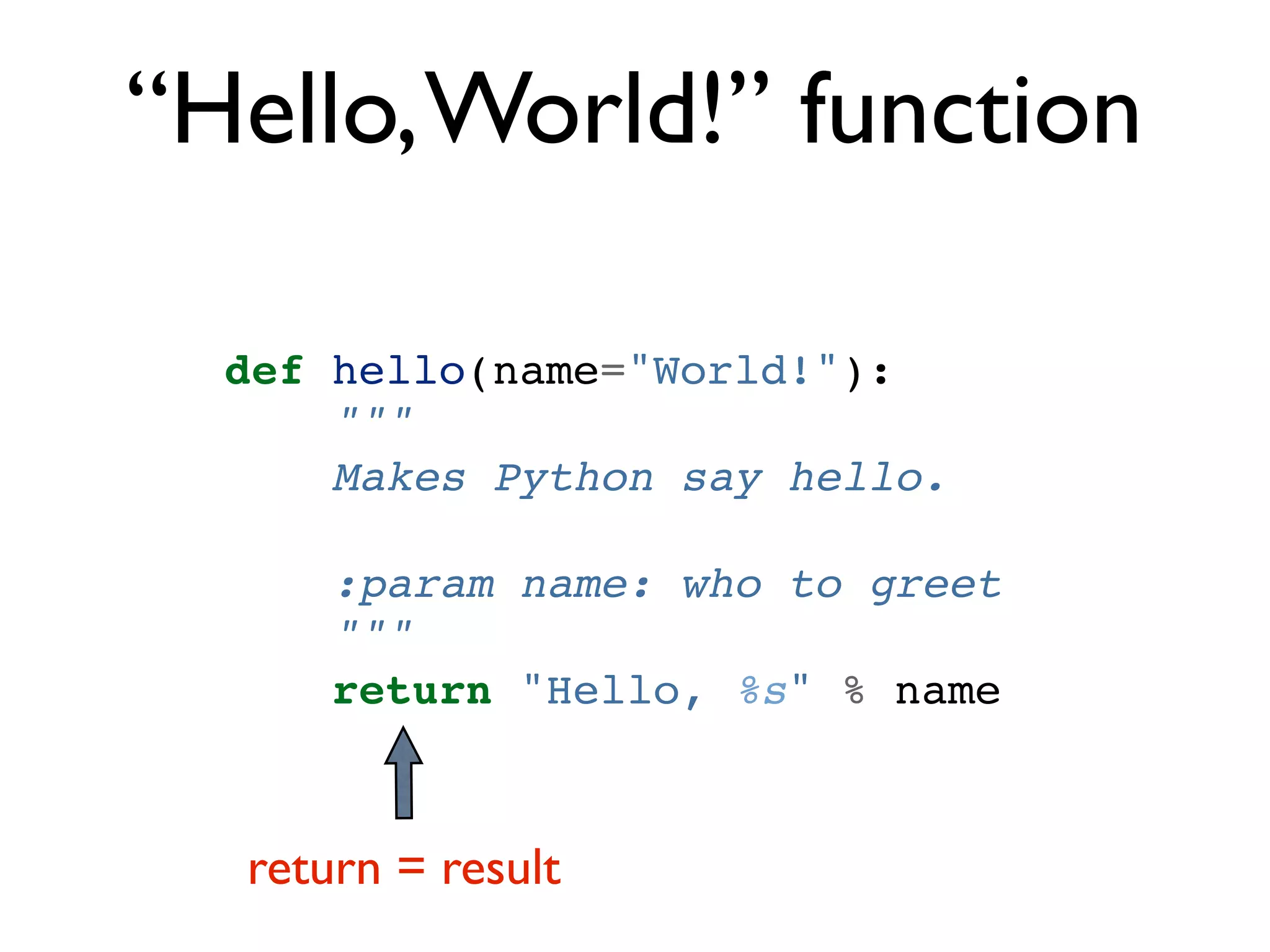
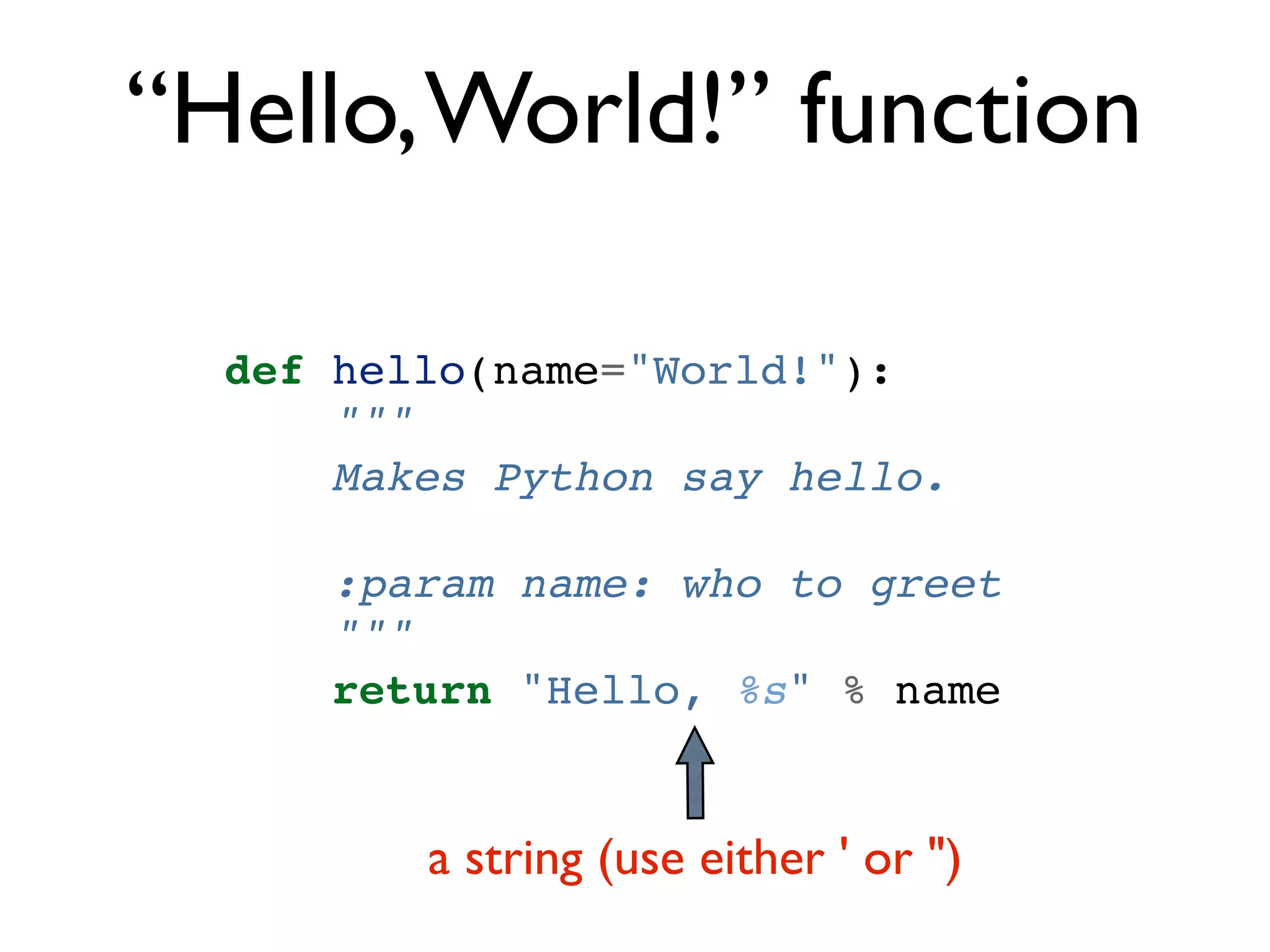
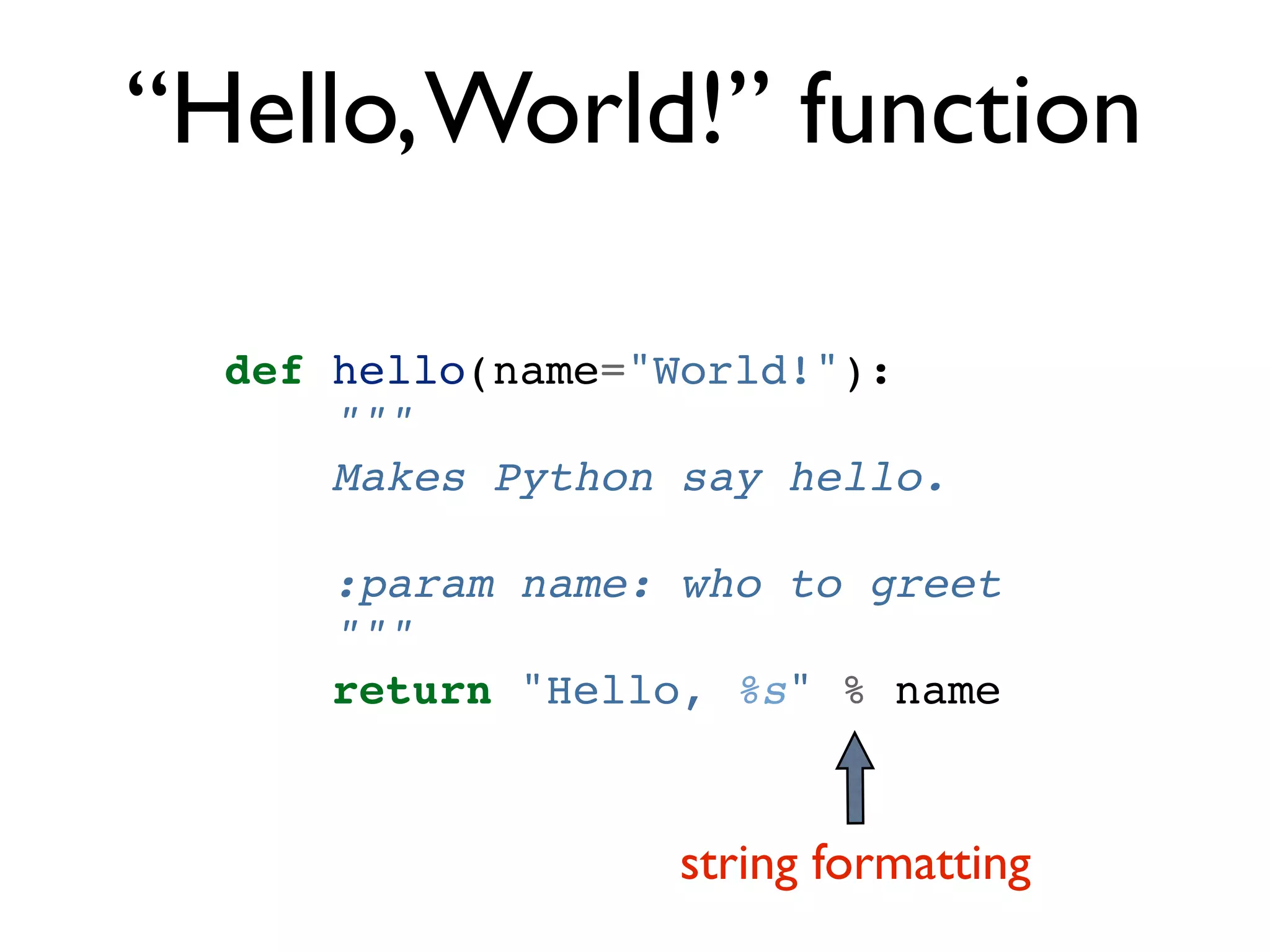
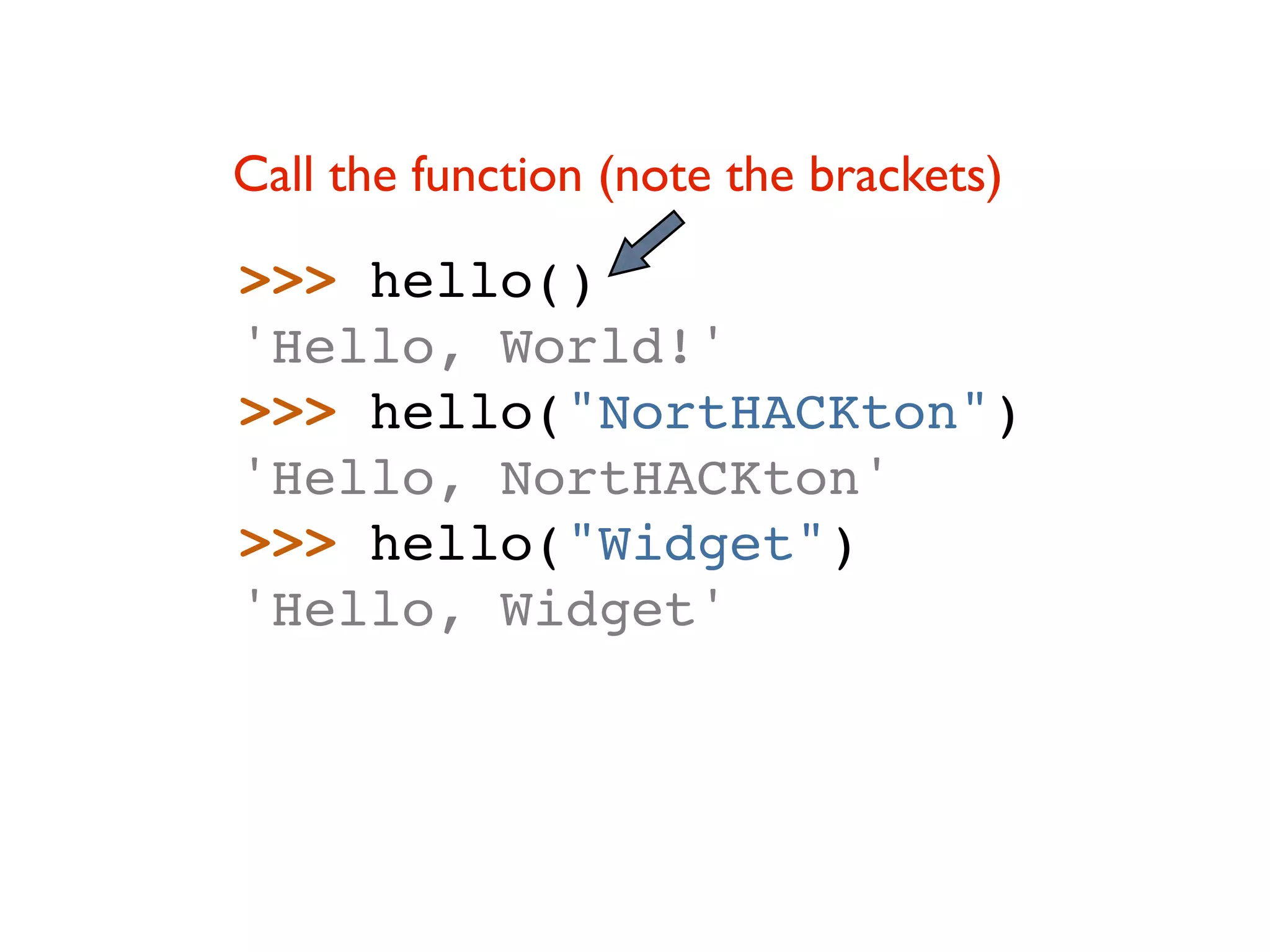
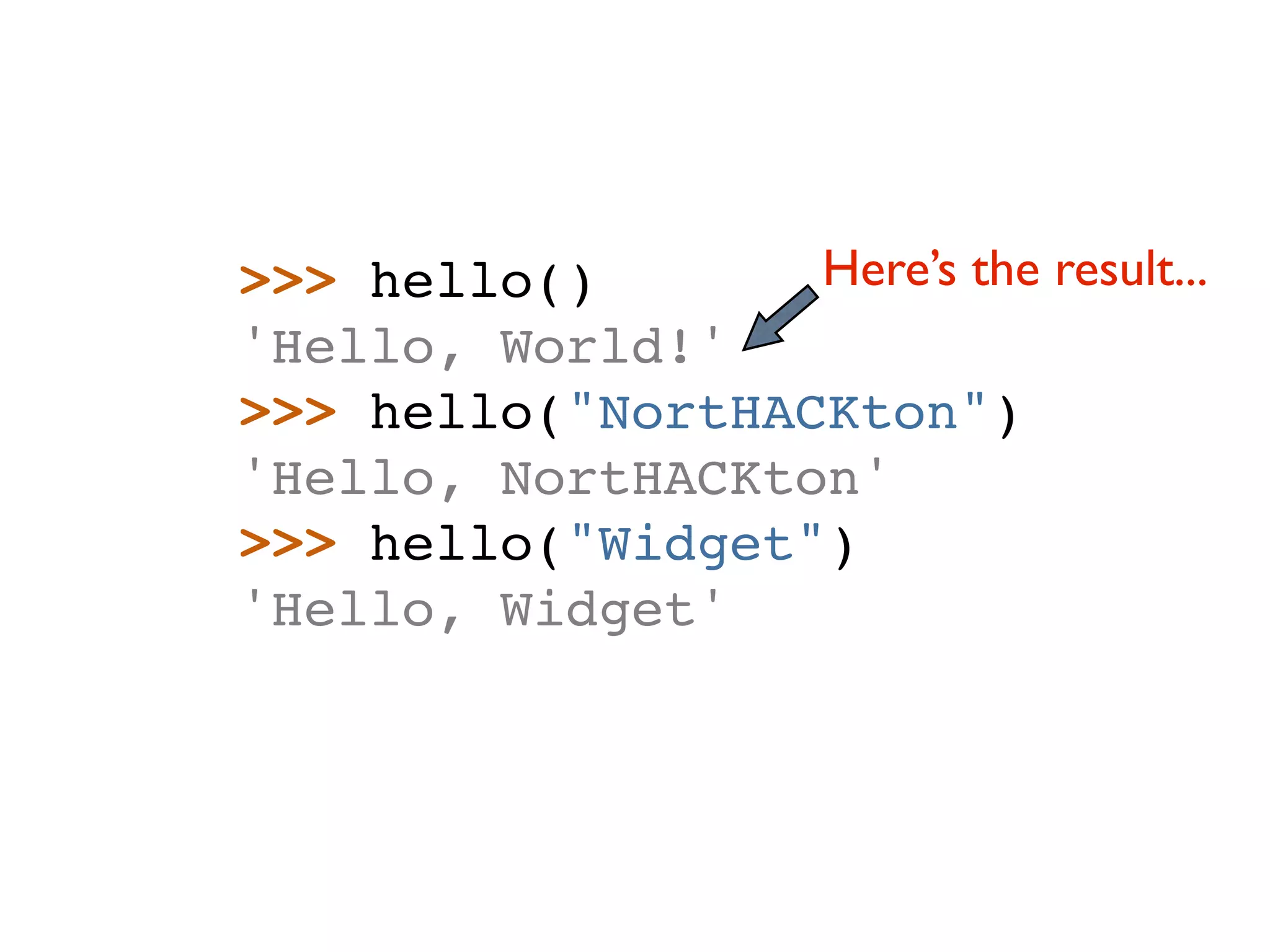
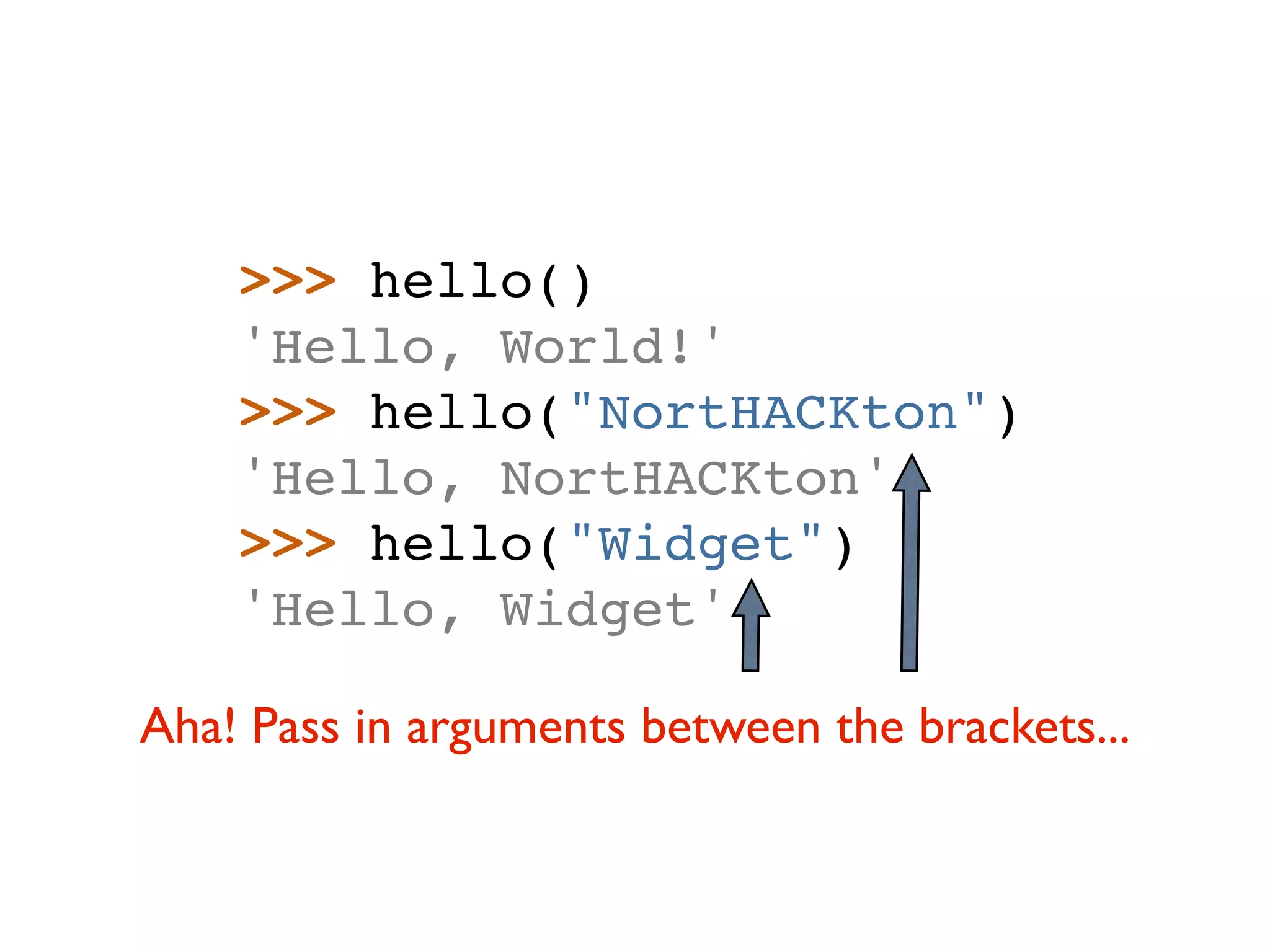
![HELP! >>> dir() ['__builtins__', '__doc__', '__name__', '__package__', 'hello'] >>> help(hello) Help on function hello in module __main__: hello(name='World!') Makes Python say hello. :param name: who to greet](https://image.slidesharecdn.com/pythonintro-110201082453-phpapp02/75/An-Inaccurate-Introduction-to-Python-25-2048.jpg)
![HELP! >>> dir() return the attributes of given scope ['__builtins__', '__doc__', '__name__', '__package__', 'hello'] >>> help(hello) display help from docstring Help on function hello in module __main__: hello(name='World!') Makes Python say hello. :param name: who to greet](https://image.slidesharecdn.com/pythonintro-110201082453-phpapp02/75/An-Inaccurate-Introduction-to-Python-26-2048.jpg)
![Assignment >>> greeting = hello('NortHACKton!') >>> greeting 'Hello, NortHACKton!' >>> type(greeting) <type 'str'> >>> foo = 1 >>> type(foo) <type 'int'> >>> bar = 1.234 >>> type(bar) <type 'float'> >>> dir(greeting) ['__add__', '__class__', '__contains__', '__delattr__', '__doc__', '__eq__', '__format__', '__ge__', '__getattribute__', '__getitem__', '__getnewargs__', '__getslice__', '__gt__', '__hash__', '__init__', '__le__', '__len__', '__lt__', '__mod__', '__mul__', '__ne__', '__new__', '__reduce__', '__reduce_ex__', '__repr__', '__rmod__', '__rmul__', '__setattr__', '__sizeof__', '__str__', '__subclasshook__', '_formatter_field_name_split', '_formatter_parser', 'capitalize', 'center', 'count', 'decode', 'encode', 'endswith', 'expandtabs', 'find', 'format', 'index', 'isalnum', 'isalpha', 'isdigit', 'islower', 'isspace', 'istitle', 'isupper', 'join', 'ljust', 'lower', 'lstrip', 'partition', 'replace', 'rfind', 'rindex', 'rjust', 'rpartition', 'rsplit', 'rstrip', 'split', 'splitlines', 'startswith', 'strip', 'swapcase', 'title', 'translate', 'upper', 'zfill']](https://image.slidesharecdn.com/pythonintro-110201082453-phpapp02/75/An-Inaccurate-Introduction-to-Python-27-2048.jpg)
![Assignment >>> greeting = hello('NortHACKton!') >>> greeting greeting holds the return value 'Hello, NortHACKton!' and it’s a string (of characters)! >>> type(greeting) <type 'str'> >>> foo = 1 >>> type(foo) <type 'int'> >>> bar = 1.234 >>> type(bar) <type 'float'> >>> dir(greeting) ['__add__', '__class__', '__contains__', '__delattr__', '__doc__', '__eq__', '__format__', '__ge__', '__getattribute__', '__getitem__', '__getnewargs__', '__getslice__', '__gt__', '__hash__', '__init__', '__le__', '__len__', '__lt__', '__mod__', '__mul__', '__ne__', '__new__', '__reduce__', '__reduce_ex__', '__repr__', '__rmod__', '__rmul__', '__setattr__', '__sizeof__', '__str__', '__subclasshook__', '_formatter_field_name_split', '_formatter_parser', 'capitalize', 'center', 'count', 'decode', 'encode', 'endswith', 'expandtabs', 'find', 'format', 'index', 'isalnum', 'isalpha', 'isdigit', 'islower', 'isspace', 'istitle', 'isupper', 'join', 'ljust', 'lower', 'lstrip', 'partition', 'replace', 'rfind', 'rindex', 'rjust', 'rpartition', 'rsplit', 'rstrip', 'split', 'splitlines', 'startswith', 'strip', 'swapcase', 'title', 'translate', 'upper', 'zfill']](https://image.slidesharecdn.com/pythonintro-110201082453-phpapp02/75/An-Inaccurate-Introduction-to-Python-28-2048.jpg)
![Assignment >>> greeting = hello('NortHACKton!') >>> greeting 'Hello, NortHACKton!' >>> type(greeting) foo holds the number 1 <type 'str'> >>> foo = 1 >>> type(foo) <type 'int'> >>> bar = 1.234 and it’s an integer (whole number)! >>> type(bar) <type 'float'> >>> dir(greeting) ['__add__', '__class__', '__contains__', '__delattr__', '__doc__', '__eq__', '__format__', '__ge__', '__getattribute__', '__getitem__', '__getnewargs__', '__getslice__', '__gt__', '__hash__', '__init__', '__le__', '__len__', '__lt__', '__mod__', '__mul__', '__ne__', '__new__', '__reduce__', '__reduce_ex__', '__repr__', '__rmod__', '__rmul__', '__setattr__', '__sizeof__', '__str__', '__subclasshook__', '_formatter_field_name_split', '_formatter_parser', 'capitalize', 'center', 'count', 'decode', 'encode', 'endswith', 'expandtabs', 'find', 'format', 'index', 'isalnum', 'isalpha', 'isdigit', 'islower', 'isspace', 'istitle', 'isupper', 'join', 'ljust', 'lower', 'lstrip', 'partition', 'replace', 'rfind', 'rindex', 'rjust', 'rpartition', 'rsplit', 'rstrip', 'split', 'splitlines', 'startswith', 'strip', 'swapcase', 'title', 'translate', 'upper', 'zfill']](https://image.slidesharecdn.com/pythonintro-110201082453-phpapp02/75/An-Inaccurate-Introduction-to-Python-29-2048.jpg)
![Assignment >>> greeting = hello('NortHACKton!') >>> greeting 'Hello, NortHACKton!' >>> type(greeting) <type 'str'> >>> foo = 1 >>> type(foo) bar holds the number 1.234 <type 'int'> >>> bar = 1.234 >>> type(bar) <type 'float'> >>> dir(greeting) and it’s a float (’ing point number)! ['__add__', '__class__', '__contains__', '__delattr__', '__doc__', '__eq__', '__format__', '__ge__', '__getattribute__', '__getitem__', '__getnewargs__', '__getslice__', '__gt__', '__hash__', '__init__', '__le__', '__len__', '__lt__', '__mod__', '__mul__', '__ne__', '__new__', '__reduce__', '__reduce_ex__', '__repr__', '__rmod__', '__rmul__', '__setattr__', '__sizeof__', '__str__', '__subclasshook__', '_formatter_field_name_split', '_formatter_parser', 'capitalize', 'center', 'count', 'decode', 'encode', 'endswith', 'expandtabs', 'find', 'format', 'index', 'isalnum', 'isalpha', 'isdigit', 'islower', 'isspace', 'istitle', 'isupper', 'join', 'ljust', 'lower', 'lstrip', 'partition', 'replace', 'rfind', 'rindex', 'rjust', 'rpartition', 'rsplit', 'rstrip', 'split', 'splitlines', 'startswith', 'strip', 'swapcase', 'title', 'translate', 'upper', 'zfill']](https://image.slidesharecdn.com/pythonintro-110201082453-phpapp02/75/An-Inaccurate-Introduction-to-Python-30-2048.jpg)
![Assignment >>> greeting = hello('NortHACKton!') >>> greeting 'Hello, NortHACKton!' >>> type(greeting) <type 'str'> >>> foo = 1 >>> type(foo) <type 'int'> >>> bar = 1.234 >>> type(bar) <type 'float'> >>> dir(greeting) remember this..? ['__add__', '__class__', '__contains__', '__delattr__', '__doc__', '__eq__', '__format__', '__ge__', '__getattribute__', '__getitem__', '__getnewargs__', '__getslice__', '__gt__', '__hash__', '__init__', '__le__', '__len__', '__lt__', '__mod__', '__mul__', '__ne__', '__new__', '__reduce__', '__reduce_ex__', '__repr__', '__rmod__', '__rmul__', '__setattr__', '__sizeof__', '__str__', '__subclasshook__', '_formatter_field_name_split', '_formatter_parser', 'capitalize', 'center', 'count', 'decode', 'encode', 'endswith', 'expandtabs', 'find', 'format', 'index', 'isalnum', 'isalpha', 'isdigit', 'islower', 'isspace', 'istitle', 'isupper', 'join', 'ljust', 'lower', 'lstrip', 'partition', 'replace', 'rfind', 'rindex', 'rjust', 'rpartition', 'rsplit', 'rstrip', 'split', 'splitlines', 'startswith', 'strip', 'swapcase', 'title', 'translate', 'upper', 'zfill']](https://image.slidesharecdn.com/pythonintro-110201082453-phpapp02/75/An-Inaccurate-Introduction-to-Python-31-2048.jpg)
![Assignment >>> greeting = hello('NortHACKton!') >>> greeting 'Hello, NortHACKton!' >>> type(greeting) <type 'str'> >>> foo = 1 >>> type(foo) <type 'int'> >>> bar = 1.234 >>> type(bar) <type 'float'> >>> dir(greeting) ['__add__', '__class__', '__contains__', '__delattr__', '__doc__', '__eq__', '__format__', '__ge__', '__getattribute__', '__getitem__', '__getnewargs__', '__getslice__', '__gt__', '__hash__', '__init__', '__le__', '__len__', '__lt__', '__mod__', '__mul__', '__ne__', '__new__', '__reduce__', '__reduce_ex__', '__repr__', '__rmod__', '__rmul__', '__setattr__', '__sizeof__', '__str__', '__subclasshook__', '_formatter_field_name_split', '_formatter_parser', 'capitalize', 'center', 'count', 'decode', 'encode', 'endswith', 'expandtabs', 'find', 'format', 'index', 'isalnum', 'isalpha', 'isdigit', 'islower', 'isspace', 'istitle', 'isupper', 'join', 'ljust', 'lower', 'lstrip', 'partition', 'replace', 'rfind', 'rindex', 'rjust', 'rpartition', 'rsplit', 'rstrip', 'split', 'splitlines', 'startswith', 'strip', 'swapcase', 'title', 'translate', 'upper', 'zfill'] All of the attributes/functions of “greeting”](https://image.slidesharecdn.com/pythonintro-110201082453-phpapp02/75/An-Inaccurate-Introduction-to-Python-32-2048.jpg)
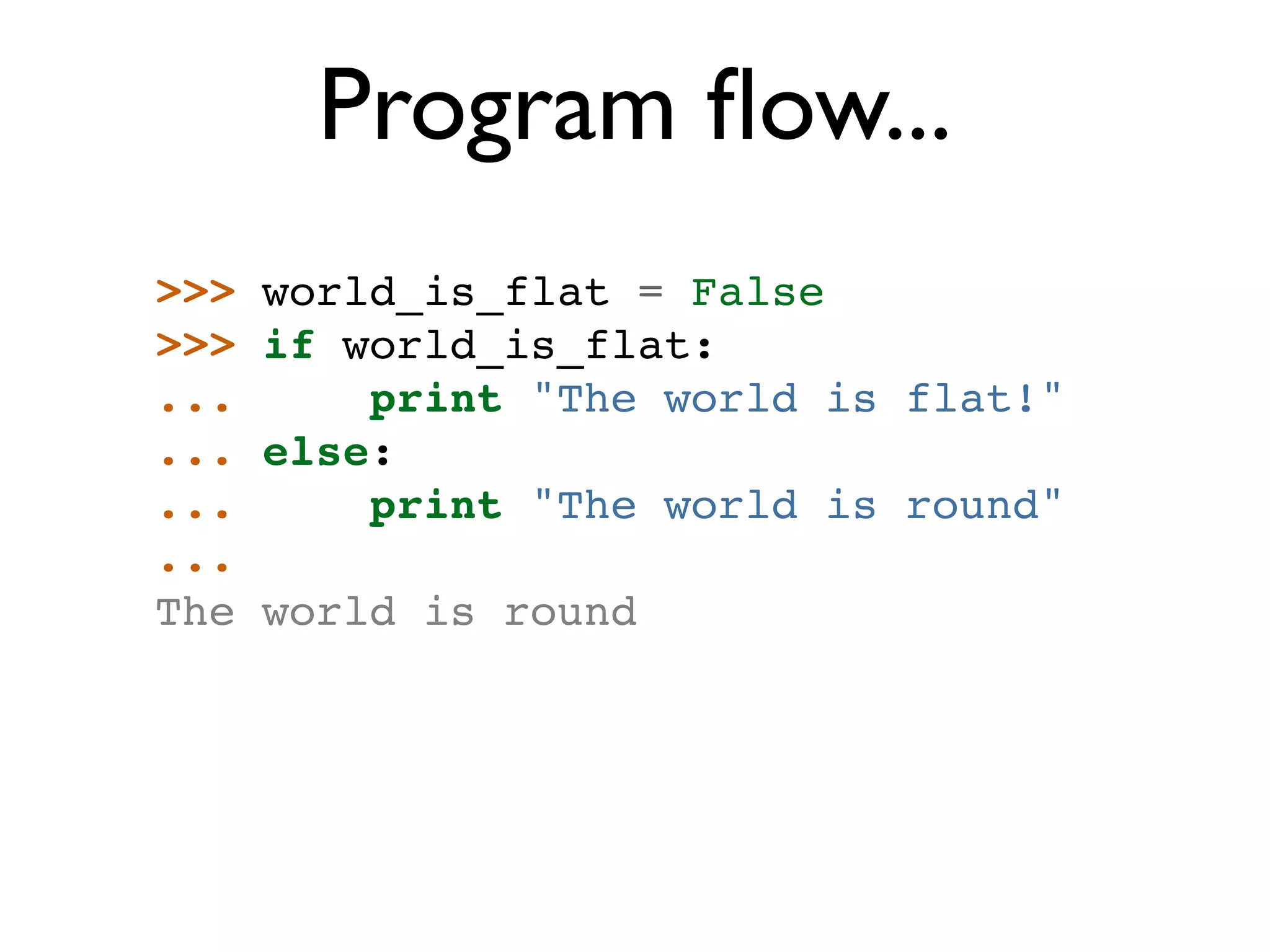
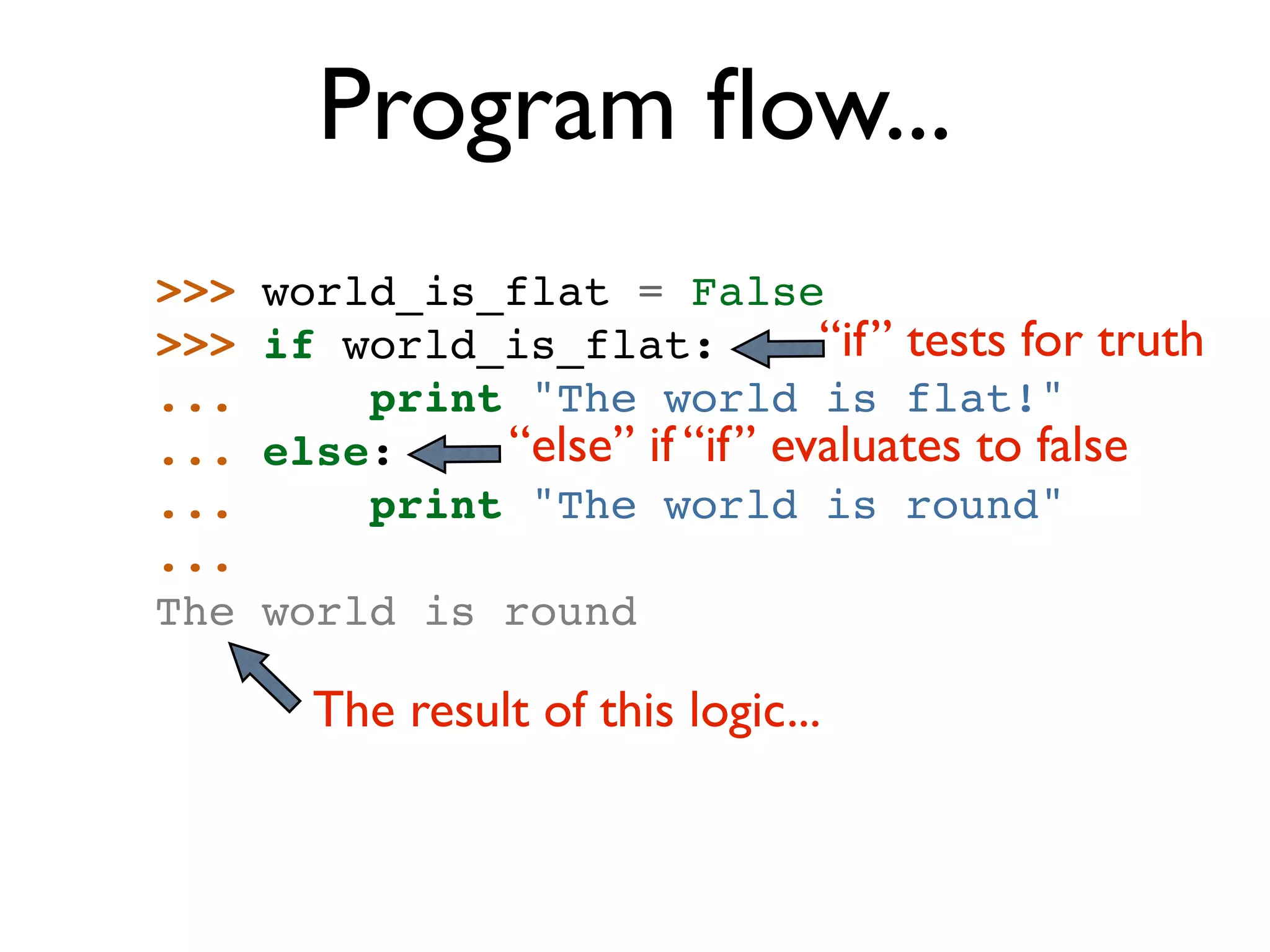
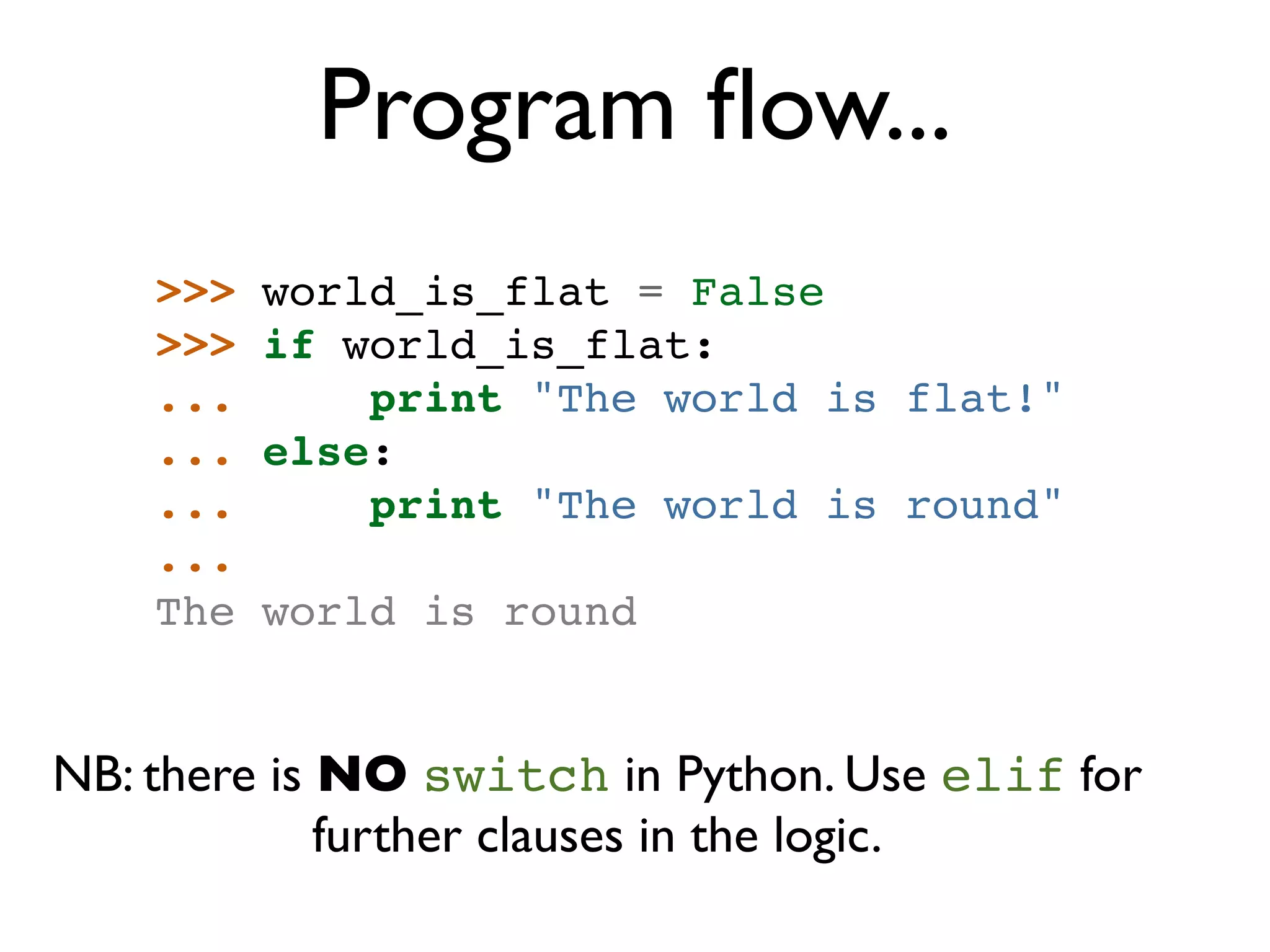
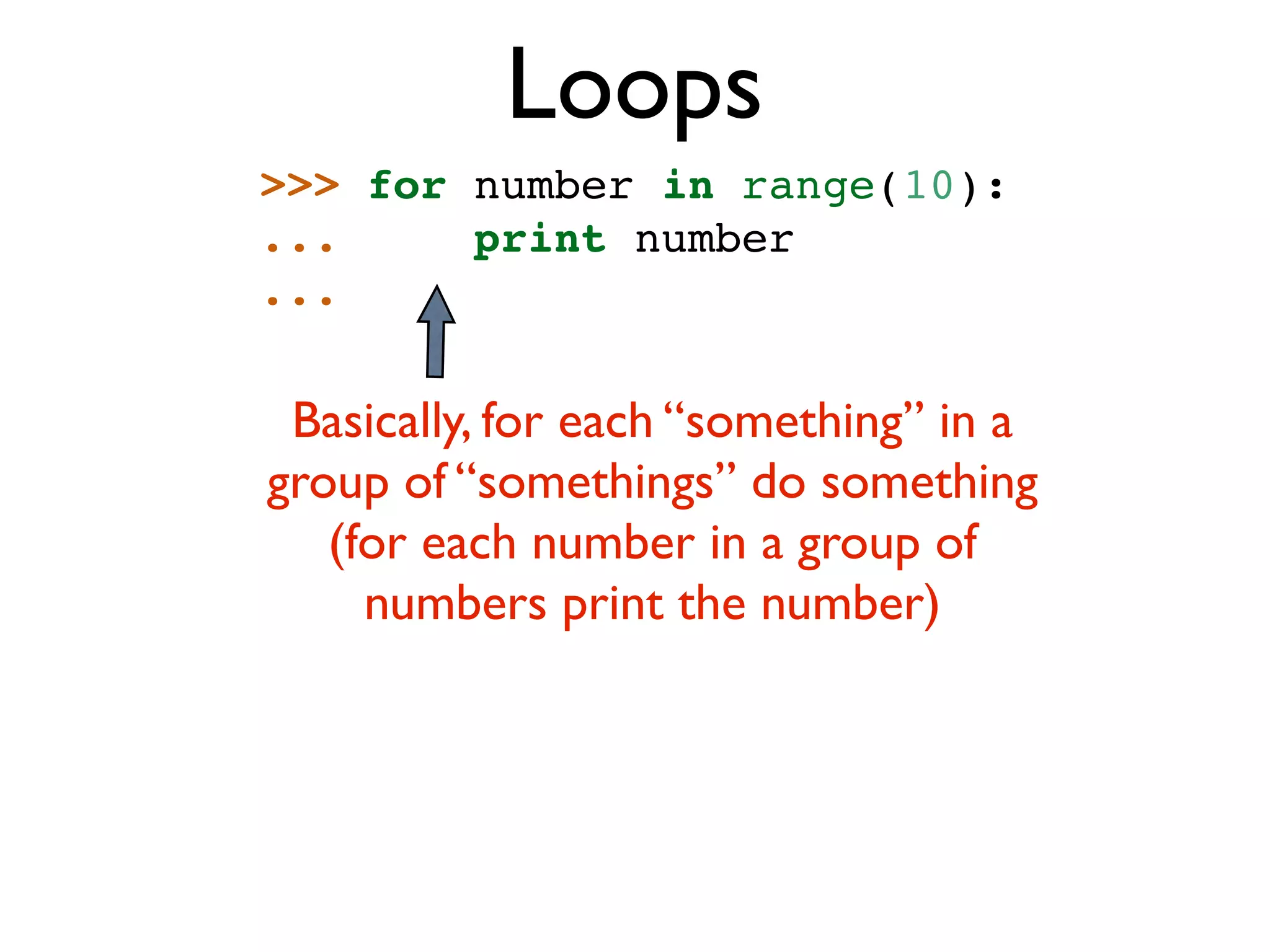
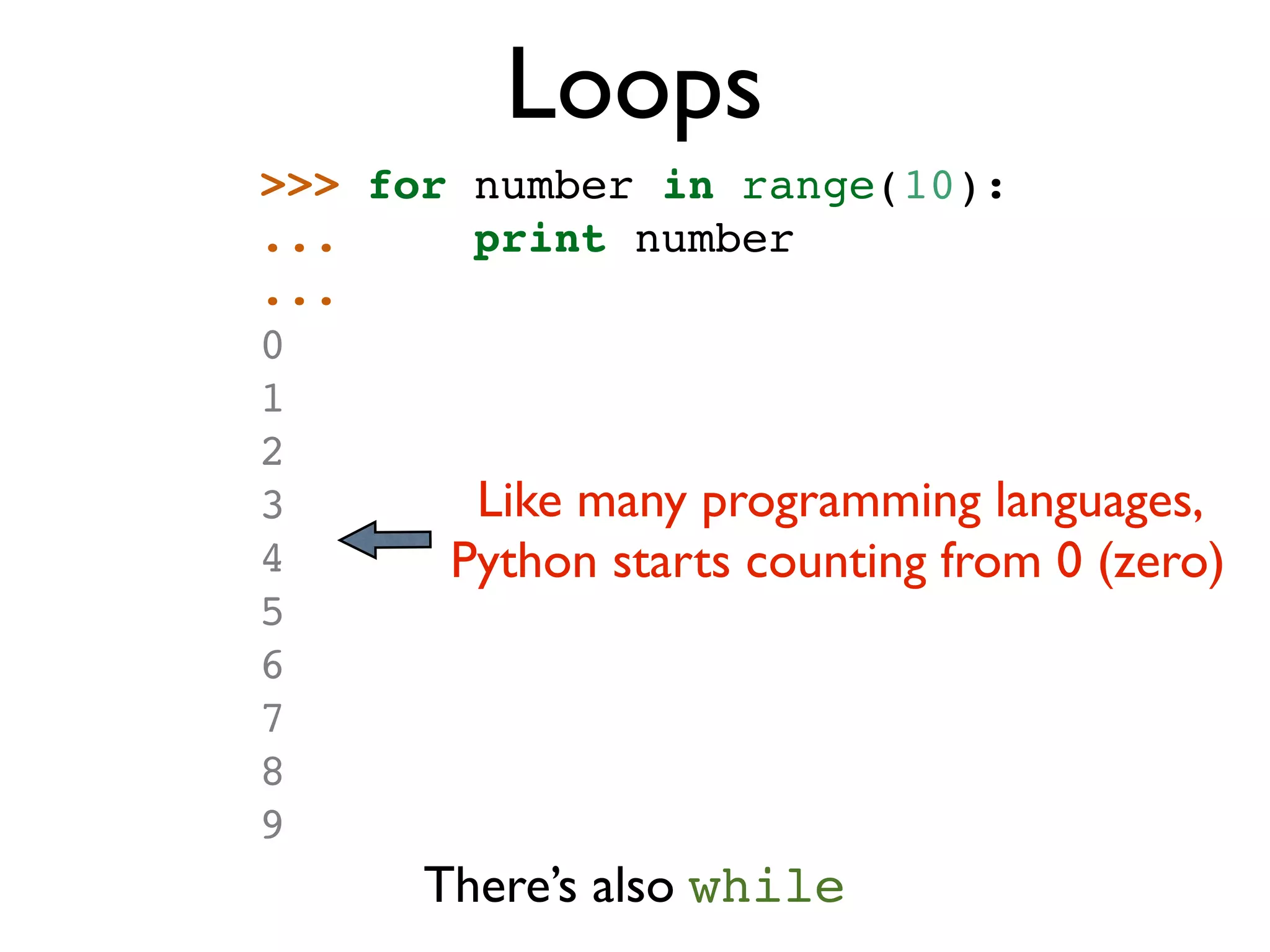
![Data structures >>> my_dictionary = { curly brackets! ... 'key': 'value', ... 1: 2, dict = key/value store ... 'branch': { ... 'leaf': 'node' (think phone book) ... } ... } >>> my_dictionary['key'] get the value from the dict 'value' >>> my_dictionary[1] 2 >>> my_dictionary['branch']['leaf'] 'node' >>> my_dictionary {1: 2, 'branch': {'leaf': 'node'}, 'key': 'value'} Why not try dir(my_dictionary)and play.?](https://image.slidesharecdn.com/pythonintro-110201082453-phpapp02/75/An-Inaccurate-Introduction-to-Python-38-2048.jpg)
![Data structures >>> shopping = ['eggs', 'ham', 'spam', 'parrot'] a list >>> len(shopping) 4 square brackets! >>> shopping ['eggs', 'ham', 'spam', 'parrot'] lists remain in order >>> shopping[0] 'eggs' >>> shopping[3] get a specific item by position 'parrot' >>> shopping[4] Traceback (most recent call last): start counting from File "<stdin>", line 1, in <module> IndexError: list index out of range zero (remember?) >>> shopping[1:] ['ham', 'spam', 'parrot'] >>> shopping[:1] ['eggs'] >>> shopping[:-1] slicing ['eggs', 'ham', 'spam'] >>> shopping[-1:] ['parrot']](https://image.slidesharecdn.com/pythonintro-110201082453-phpapp02/75/An-Inaccurate-Introduction-to-Python-39-2048.jpg)
